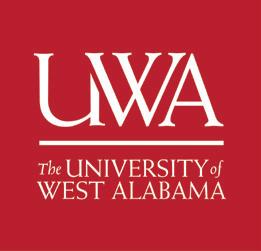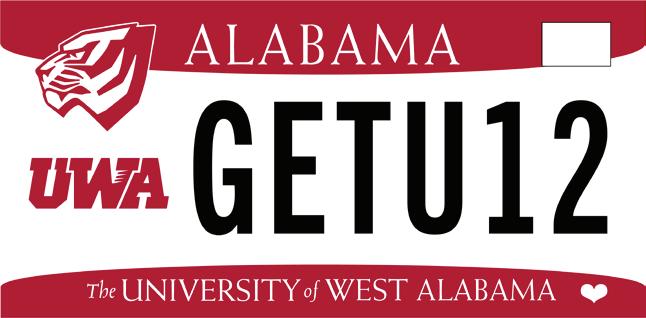






ZARIA HARRIS is a 2022 graduate of UWA’s Ira D. Pruitt Division of Nursing. A Sumter County native now in her final semester of the BSN program at UWA, she specializes in labor and delivery at Whitfield Regional Hospital in Demopolis, Alabama. She also works in family medicine and urgent care at MedCenter Demopolis. After completing the BSN, she plans to transition into a neonatal intensive care unit and intends to pursue nurse practioner or physician assistant studies specializing in neonatology at the University of Alabama at Birmingham.
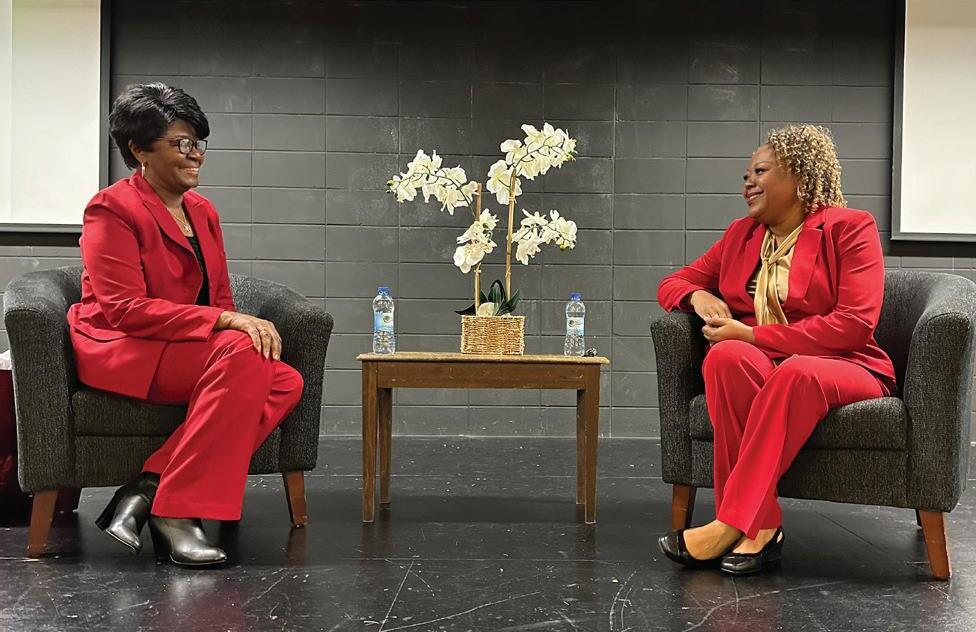


Merriam-Webster’s dictionary does not define “rural” with notions of deficiency or lack, yet the term has historically developed connotations of such. The University of West Alabama has a rebuttal for the preconceived notions that education, healthcare, business, or any other industry in rural areas should settle for fewer resources and opportunities or accept lower standards. This chapter in the nearly 200-year-old institution’s history marks a series of significant strides forward to embrace the definition.
From almost anywhere on campus – whether a sleek new athletic facility, a renovated and relocated historic chapel, miles of sprawling nature trails—visual reminders of what makes the University of West Alabama’s campus unique are unmistakable. Flowing fields flank the busy thoroughfare that connects the north and south ends of campus, which spans more than 600 acres of ground.
Tiger Stadium’s south end zone sits less than a half mile from a bend in the Sucarnochee River, the 50-mile coastal-plain waterway that connects to the Tombigbee River. A labyrinth of canopied nature trails flanks Wallace Hall. Tartt Field is perched on a bank of Lake LU, the 54-acre fishing paradise that regularly gives up record-sized bass. And near the campus’ center, not far from a row of dormitories, is the Alamuchee-Bellamy Covered Bridge, a Sumter County Civil War-era relic relocated decades ago to the campus duck pond.
Visually, geographically and culturally, UWA is inseparable from the ruralness it shares with Livingston, the county seat whose population has never topped 4,000.
A regional state university in Alabama’s historic Black Belt, bear-
ing the label ‘rural university’ is an acknowledgement administration and faculty no longer avoid or downplay. Instead, they’re leaning into the notion and turning a once-perceived negative into a national brand that’s assuming a significant role in modernizing higher education in rural America.

“It’s okay to be unique, and it’s okay to embrace what you are—not just embrace it, but let it shine,” said Dr. Mary Hanks, chair of the University of West Alabama’s Ira D. Pruitt Division of Nursing. Her office, on the third floor of Spieth Hall, is a stone’s throw from the Covered Bridge. “You have to excel in who and what you are. So, yes, we should let the world know exactly who we are. We are rural and we love it. But this is why we love being rural: These are the students we produce, rural is not negative, rural is positive.”
The decision to rehabilitate UWA’s rural label into an academic tool for growth was “very intentional, very conscious,” said UWA President Dr. Ken Tucker, one that campus leaders largely supported from day one. “I think people understood the need to try to turn a perceived negative into a positive, and they understood that there was a potential untapped market out there.” In 2023, UWA features a smorgasbord of academic disciplines and admin-
UWA embraces label historically assumed synonymous with inadequate to instead reach new heights and support uncharted rise of rural initiatives
istrative offices designed to educate leaders for rural communities and improve the lives of rural residents. Instead of hiding from the label, UWA is running toward it.
“I’m proud of the fact that we have been at the forefront of that,” Tucker said. “We are on the front end of it, we have made connections nationally with major rural organizations and they have helped us spread the word about rural education.”

A wide collection of UWA administrators is quick to credit Tucker, the university’s former dean of the College of Business, for issuing what they describe as a campus-wide charge to embrace UWA’s ruralness and jettison old habits of trying, and failing, to shroud the obvious. Tucker, from Demopolis, became UWA’s 12th president in January 2015.
“Within the last decade, there’s been a movement across the nation to really embrace rural,” said Dr. Jan Miller, dean of UWA’s College of Education. “But Dr. Tucker has really challenged us to step up, and that’s what makes us unique, what makes us different.”
Hanks mentions one of UWA’s familiar marketing slogans, “There’s Something About This Place.” It’s pertinent, she believes, in how the university relates to the students and faculty it recruits. “There’s something about the personality of the person that has to be drawn here. You have to be drawn to a familial type setting where you want the interaction, you want the camaraderie, you want to be able to collaborate. There’s definitely something different about the makeup of these students and the makeup of the faculty teaching here.”
The result is a double-pronged approach that equates to burning both ends of a candle, one academic, the other economic. It’s holistic by design. Foremost are the degree programs and scholarship awards now in the university’s catalog that are designed for rural applications or students from rural communities, or both.
“To me, the overarching mission is to serve the region,” Hanks said, looking from the lens of equipping the healthcare industry with registered nurses and BSNs. “We have maintained that we are going to serve our region and we are going to serve the needs of our community.” To that end, UWA’s administration and faculty have aggressively developed new degree programs that follow Tucker’s charge.
In embracing its rural label, administrators and faculty say, UWA is developing a national reputation for tailoring programs for rural-based students and using its Black Belt location as more than a mailing address.
(continued on next page)
Started in 2018, UWA’s popular DOCTORATE IN RURAL EDUCATION is a first-in-the-nation online program designed to empower educators with advanced skills specific to teaching in rural settings. Place-based learning is one of the program’s cornerstone components.
The university’s newest terminal degree, the online DOCTOR OF BUSINESS ADMINISTRATION IN RURAL BUSINESS, launched in 2021 with two tracks: rural entrepreneurship and innovation, and rural and transformational leadership. Graduates could teach at the faculty level or advance to roles involving rural public policy, agricultural policy, farming business and agricultural infrastructure.
PROJECT REACH, a teacher-residency program, targets faculty shortages in high-need schools in Baldwin, Mobile, Tuscaloosa and Sumter counties. Graduates earn a Master of Science in Education and receive a $45,000 residency stipend.
PROJECT EARN, a scholarship program funded by a $2.4 million grant over a five-year period by the U.S. Department of Health and Human Services, targets nursing students from disadvantaged backgrounds.
PROJECT REP (Rural Education Project) is designed for teachers willing to work in rural schools with high teacher turnover and depressed student achievement.
The BLACK BELT TEACHER CORPS Teach for Alabama scholarship program attracts students who commit to teaching for three years in public schools in the Black Belt or other rural and high-need regions.
Though not a degree program, UWA’s CAHABA BIODIVERSITY CENTER in Bibb County is a rural research-based site for faculty and students interested in botanical and zoological biodiversity, ecology, archaeology, water quality and conservation land management.
The FUTURE RURAL EDUCATOR SCHOLARSHIP, a new one-year award that will offer two high school graduates from the Black Belt region $500 each. It’s the brainchild of Dr. Brandon Renfroe, a 2022 graduate of UWA’s Doctor of Education program.
“I really think we’re trying to embrace rural and celebrate that because there are so many advantages to that,” said Miller, who also is a board member of the Rural Schools Collaborative, another UWA partner. “We can be as innovative as we want to be. What’s awesome is to be able to go and say, ‘Okay, I want to pitch this idea, and you can shoot it down or we can mold it and think about it.’ We don’t really close doors and we partner with just about anybody who is willing to partner.”
By the simplest definition, UWA is a public regional university whose core duty is to educate students, generations of whom have flocked to the Livingston campus for nearly 200 years. But Dr. Tina Jones, UWA’s new provost and a longtime faculty member who also served as vice president for economic and workforce development, has been deeply involved in the other end of that figurative candle, the one designed to assist local- and state-level entities with job recruitment, worker training and boosting the region’s economic outlook.
“We’re not just an institution of the Black Belt,” Jones said. “We are an institution who is rurally located, and the issues that we encounter are also issues that other communities, other regions even, encounter. There is this opportunity in which we may be able to share and learn from each other.” Tucker, from his second-floor office in Webb Hall, looks inward when mentioning UWA’s role with Uni-
versity Charter School, which opened in 2018 in Lyon Hall on the UWA campus, with the goal of revamping K-12 public education in Sumter County. “In order for the university to grow and complete our mission,” he said, “we need our area to grow and develop.”
In May, UCS graduated its first senior class after adding grades 9, 10, 11, and 12 in subsequent years after opening. In August, UCS cut the ribbon and welcomed its fourth through twelfth grade students to a new $25-million facility. The new Justin L. Smith Campus of UCS is located on the north end of UWA’s Wise Loop, named for the late Smith, a Sumter native and UWA graduate who championed its establishment as a member of UWA’s Board of Trustees.
“We opened UCS with an enrollment of 304 in 2018 recognizing that there was an immediate need for the choice that the school provides,” said Dr. J.J. Wedgworth, UCS head of school. “Now, expanding into our new facility and serving an enrollment of 700, we can say with confidence that we are meeting a need for our county.”
Wedgworth, who became interim vice president for institutional advancement for UWA in March, says the need extends beyond the current population of Sumter County in that it supports recruitment and retention for UWA employees, for employees of prospective businesses and industries looking at Sumter County or west Alabama, and as a uniquely-convenient opportunity for UWA students who will pursue careers in education.
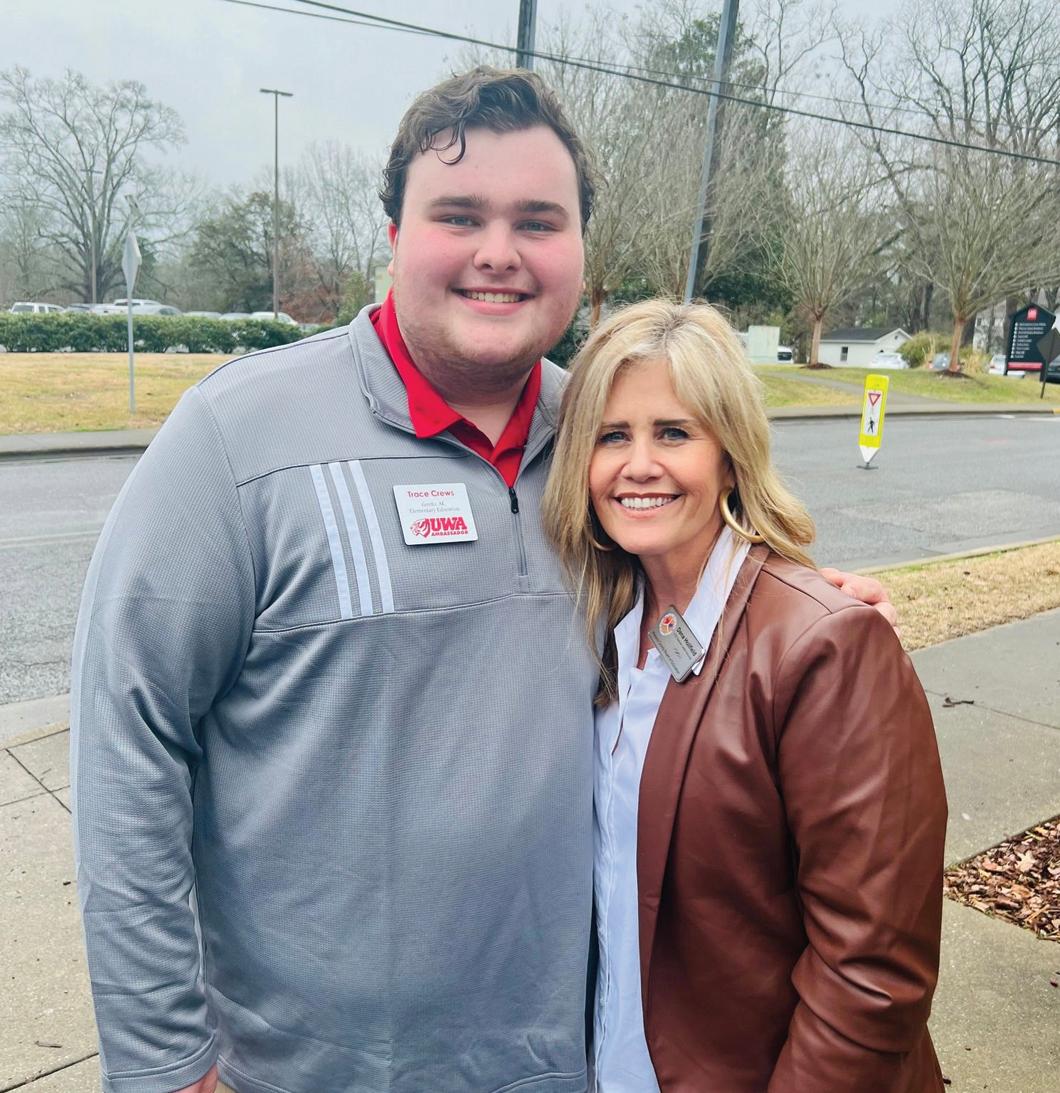
Sumter County’s rural reality is never far from UWA’s discussions. The county’s poverty, median household income and per-capita income levels pale in comparison to state averages. Just prior to the pandemic, Sumter County’s total employment level dropped more than six percent in 2019-2020, according to Census data. Amid those trends, myriad departments at UWA are playing tangible roles in lessening the economic hardships in Sumter County and the Black Belt at large.
In the Office of Economic and Workforce Development, Jones, economic developer Allison Brantley, and their colleagues offer an encyclopedic list of services that mirror Chamber of Commerce duties: professional support for new or expanding business site selection; workforce training programs through the university’s Center for Workforce Development; training and recruitment programs; research and grant support; and liaison services between business owners and government representatives. Successes are common, both small and sizeable. In 2019, Sumter County celebrated its selection as the site of a $375 million Enviva wood-pellet production plant in Epes that promised to create nearly 350 direct and indirect jobs. Along with state and local officials, UWA played an essential role in recruiting the Maryland-based company to Sumter County. At the June 2023 groundbreaking, Enviva CEO
Thomas Meth announced that the facility would be the largest of its type in the world.

Because UWA is among the county’s largest and most stable employers, Jones said, “we have a commitment to the community in which we live. That is what we are doing. We are fulfilling our responsibility as a good neighbor.” In blunt terms, administrators say, these economic-development duties come with the job of working at a rural university in one of the nation’s most impoverished areas. “It means that we play some roles that other institutions of higher ed probably would never even think about doing,” Jones said.
In UWA’s Office of Sponsored Programs and Research, it’s not unusual for director Rodney Granec to field a request from a Black Belt town or county for assistance. Some need help writing a grant, a fundamental service of Granec’s office. Others are unsure how to establish a nonprofit. City administrators request his expertise on a variety of matters. It’s not a direct objective of UWA’s core mission— educating students—Granec admits, though he believes it helps the University in other matters. “For most rural communities, collaboration is not a choice,” he said, “it is an essential tool for sustainability. I kind of put that in with rural education. Rural education is a key component for that community, area and region to thrive, or to even have an opportunity to thrive.”
Just as UWA can’t separate itself from its rural location, UWA’s
economic development efforts can’t—and shouldn’t—be viewed wholly apart from its core academic mission, Tucker noted. The intertwining is intentional.
“It’s the old ‘rising tide lifts all boats’ concept,” he said. “The more (economic development) we can bring in, that’s more tax revenue for the city and the county. The more services they can provide, the more job opportunities and higher wages with better benefits we’ll have. That brings us more students, too. As more families move in to work at a big plant, they will bring children with them, and when they graduate from high school, we will be here for them. So that’s all part of the larger vision.”
One of higher education’s shared traits is the nationwide decline in college enrollment, which in spring 2022 dipped 4.1 percent below spring 2021 numbers, according to a National Student Clearinghouse Research Center report. It’s a trend with multiple contributors, from the pandemic to economic concerns, from job opportunities that don’t require a four-year degree to the burden of repaying college loans.
According to data from the National Center for Education Data Statistics, overall college enrollment nationwide peaked in 2010 at 21 million. Undergraduate enrollment in the nation peaked in 2015 at 3.2 million, declining slightly through 2020, then (continued on next page)
COVID-19 sent shockwaves through the college landscape. UWA was among only seven percent of public universities in the nation to maintain elements of the in-person college experience at the onset of the pandemic, with classes resuming in the fall of 2020 after coming to a screeching halt near the end of the spring semester. The aftermath of the pandemic includes a dramatic shift in lifestyles, financial ability, and changes in the workforce prompted by virtual capabilities and marketplace needs.
Amidst the nationwide decline in college enrollment, UWA isn’t immune. Although on-campus enrollment numbers mirror the Black Belt’s depopulation trend as indicated by the Census, more than 4,500 students, many from outside the University’s traditional recruiting areas, are enrolled in UWA’s expanding catalog of online programs.
tial students, especially if they are coming from a more metropolitan area,” Baker said. “So it’s our job to inform our admissions counselors on the happenings not only on campus, but we’ve also got to know what’s going on around Livingston so students know the options once they get here.”
UWA has four admissions counselors dedicated to recruiting high school students; another concentrates on transfer students. The messages they deliver, Baker said, are rooted in honesty so students and their families make informed decisions that court success. Put another way, UWA’s admissions director doesn’t want to mislead prospective students about the realities of rural education. Livingston isn’t Birmingham. “We don’t want to sell something that we are clearly not and that we will never be,” she said, “but show them who we are in the most authentic way.”
In other words, UWA’s admissions counselors use the university’s ruralness as a positive, not as an ignorable negative. Prefer smaller class sizes? UWA has that. Enjoy ample communication with faculty? UWA has that. (At UWA, Tucker said, “the professors will know the students’ names.”) Appreciate the outdoors and a campus landscaped with lakes and walking trails? UWA is surrounded by it. Interested in curriculum designed for post-graduation success in rural communities? UWA has that, too, along with renowned degree programs in other fields that belie the university’s physical stature.
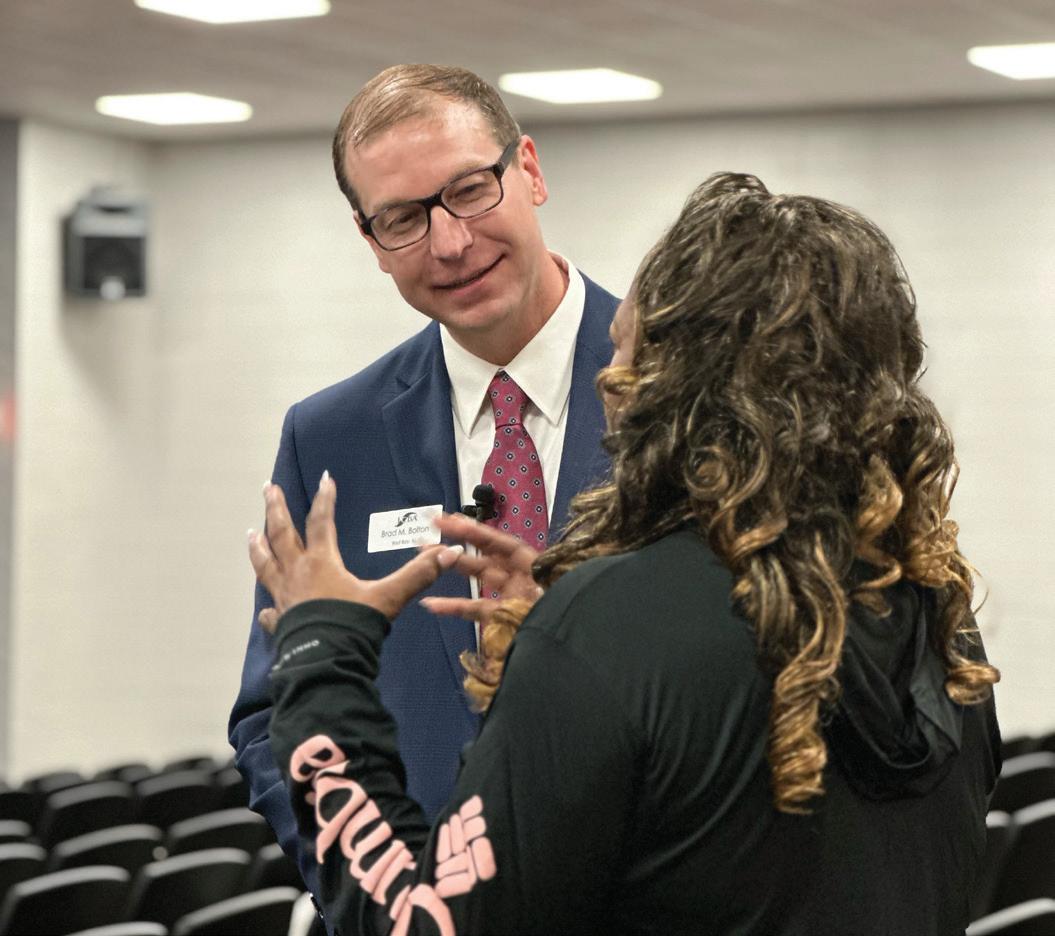
Brad Bolton, a 2009 College of Business graduate, visited campus to talk with students about community banking’s impact on local communities and their economies. Bolton is chairman of Independent Community Bankers of America and is one of many alumni leaders who share their expertise with students during networking opportunities.
Libba Baker, UWA’s director of undergraduate admissions, needs no reminder of those national trends. “It’s harder to recruit students across the board right now,” she said. “They have so many options at their fingertips.” But Baker hasn’t lowered her expectations for UWA’s ability to recruit students interested in a quality, four-year degree from a rural university deep in the heart of west Alabama. Her voice bubbles with optimism.
Not every university is for every student, she says. On that note, UWA isn’t different from Ivy League schools or faith-based private universities. Fit matters.
“I think a lot of times the rural label may scare some of our poten-
Hanks emphasizes needs of students from small cities or those more comfortable on smaller campuses. When they attend larger universities, they are trying to fit “their square into the circle … They feel out of place, so they cannot find their bearing and they don’t know why. You’re trying to fit your square into the circle, and you should have been in a place that fits your personality.”
New high school graduates, Baker said, often mold their college expectations from what they see on television. Those expectations can cloud decisions and fuel what Hanks’ refers to in her squareand-circle description. A goal of UWA’s admissions counselors is to sell the university and its range of amenities while also helping students with one of the most important decisions of their lives.
“We’re in higher education because we want to support students, for them to get their associate, bachelor, master, or doctoral degrees so that they can get a job and be employed,” Baker said. “It is important to know our student population and what may be the best fit for the students. And if it is UWA, that’s fantastic.”
At the heart of a rural university’s reality is public perception. It’s sticky, like molasses, hard to shed. Marketing campaigns don’t offer guaranteed improvements in how a university is viewed. In
Ashley Bishop and Alison Mayfield are pro-certified workforce ready nursing graduates. They are members of UWA’s class of 2023 and have passed NCLEX. The two classes before theirs also boast a 100% first time pass rate on NCLEX. Of the 188,005 first-time test takers nationwide in 2022, only 79.90% passed the first time.

UWA’s case, human nature’s inherent tendency to equate “rural” with “deficient” is core to a central belief: that UWA and its kindred universities must control their narratives and change the public’s understanding of what rural education can be.
“People seem to think, ‘Oh, poor, pitiful, ‘rural’ can’t do any better,’ until they actually come into the campus and walk in our shoes and see,” said Miller, who has more than a fair share of regional and national partners with the College of Education. “They’ll
say, ‘Oh, my gosh, this is the best kept secret.’ So I think the rural context is part of telling our stories. Our successes follow our students, but for forever, rural would be considered at risk, and that’s not the case. We have a lot of stories yet to be told.”
Hanks, the nursing school chair, decries what she calls the “negative connotations” associated with rural America, not rural education alone. The tendency to view bigger as better, and rural as an oppressive codeword, is hard to dissolve. “But the only way you change the narrative is to rewrite the story,” she said. “So I think that UWA and other rural institutions, we have a great opportunity to rewrite the narrative.”
In Livingston, UWA’s modern narrative isn’t substantially different than those of its past. The region, Tucker says, “is still primarily agriculture, farming, timber, cattle, catfish, and that’s great if you like woods and hunting and fishing. A lot of people do.” The regional makeup of the student body is profound. The decision to steer into the skid, to neutralize rural education’s harshest critics through rural-based degree programs and regional economic-development efforts, is one UWA’s administrators are glad they made. Championing a campus lush in greenspace and natural habitat is the easy part.
“But that’s the kind of people we have to appeal to, clean air, slower lifestyle where relationships matter and people take care of each other,” Tucker said. “Our students have more opportunities to develop the kind of skills and ability and knowledge that will make them successful, not only while they’re here, but also in the real world when they get out.”
UWA is reimagining rural.

On any given day, conversations with Dr. Thomas Ratkovich can feature topics so unrelated yet masterly that they’re hard to absorb. They could involve the first isomorphism theorem, the best law enforcement training for active-shooter drills, the work of heralded British mathematician Andrew Wiles, the finer points of driving forklifts and snowplows, how to protect crime-scene evidence, or the definitions of topological groups and closure axioms.
The key is recognizing the speaker. Is it Dr. Thomas Ratkovich, the chair of the University of West Alabama’s Department of
Mathematics? Or is it Cpl. Thomas Ratkovich, the field training supervisor for the UWA Police Department?

ONE MAN, ONE UNIVERSITY, TWO DIFFERENT POSITIONS
“ To me, apart from the uniform, I’m one and the same,” Ratkovich said. “I’m a cop over there, even if I’m in street clothes. And I’m a mathematician over here, even if I’m in my uniform.”
Literally, in fact.
A UWA faculty member since 2001, Ratkovich spent years
mimicking Clark Kent in the phone booth—switching between professorial garb and a police uniform—depending on his schedule, often multiple times a day. His students saw a civilian teacher. People walking across campus saw an officer on patrol. He smirks at the thought: “I was a master of changing clothes after teaching.”
Ratkovich—known by colleagues as “Cpl. Rat”—no longer bothers with that charade. It’s wasted time. If he’s on campus, he’s almost always in uniform, ready to respond as an officer if needed. Parents of UWA students, said Police Chief Josette White, “are amazed and pleased to know this adds another layer
of safety for their students.” Ratkovich is convinced that students don’t flinch at the sight of an armed university police corporal guiding their lessons.

“They’re used to it because most of them come from small high schools around here in rural areas where everyone there wears five or six hats,” he said. “Most of them respect it. Every class I’ve ever been in, they’ve always thought it was cool that their professor is also a police officer. So there’s no real line of delineation between the classroom and the patrol vehicle.”
(continued on next page)

How Ratkovich assumed this career duality matters, given its uniqueness, but it’s important to note that it occurred organically. There was no agenda to do both. Whether coincidence or fate, an intelligent student from Chicago’s northwest suburbs excelled at the highest levels of math, owned what he describes as a “cop mentality,” and held a deep-seated belief in the value of public service and safety.
For the latter, “Adam-12” is partly to blame.
From 1968 to 1975, that television drama gave viewers a glimpse of then-modern law enforcement through the eyes of fictitious Los Angeles patrol officers Pete Malloy and Jim Reed. Ratkovich so adored the show that today he still remembers its opening sequence. “I was a typical little kid,” he said. “I always wanted to be a police officer when I grew up. Most young boys at some point say they want to be a police officer. I was no different.” When officers would visit his school, their comportment made an impression. He noticed the shine of their uniform badges. “As I got older,” he said, “I always had a respect for law enforcement — not just law enforcement officers, but law enforcement in general.”
Mathematics, though, guided his career pursuit because of two unallied factors: aptitude and geography. Math came naturally to him. He enjoyed the mental challenge and being the math whiz others would ask for help. He benefited from an Illinois state public school system that at the time ranked among the nation’s substantive units. Chicago’s, he recalls, was particularly strong.
He learned mathematical notation in the second grade. He learned the concepts of natural numbers, rational numbers, real numbers and integers. He learned the letter designations of those number sets. And he took to it with aplomb. “It really impressed upon me at a very early age that I could understand what (the teacher) was saying,” he said.
Math never strayed as his academic constant. It’s what brought him south for degrees at Mississippi Valley State University and the University of Southern Mississippi, and what eventually convinced him to pursue a Ph.D. at the University of Alabama, though he harbored no intention of teaching. With two degrees, Ratkovich expected to work in a technical job, perhaps as a computer programmer. That was the plan. But brief classroom experience as a graduate assistant at USM and at a community college in Tennessee plotted a course that in 2001 brought him to UWA’s faculty in the Department of Mathematics. Law enforcement would have to wait.
“After teaching two years (in Tennessee) and one year at USM,” Ratkovich said of his decision to earn his Ph.D., “I knew that I had more left in me.”
Ratkovich hasn’t always taught or worn a police uniform. He’s worked in warehouses. He’s driven forklifts. His brother, a police officer in Illinois, owned a snowplow business, so Ratkovich has moved banks of lake-effect snow in Chicago. One job, two jobs, however many it takes.
Nearly a decade after joining the UWA faculty, Ratkovich became a campus security officer, an acknowledgement of his appreciation for law enforcement. That was 2010. Thirteen years later, Ratkovich is now the math department’s chair and a key member of White’s command team. After receiving Field Training Officer certification at the Jefferson County Sheriff’s Department Law Enforcement Training Academy, Ratkovich installed the UWA Police Department’s first field training and evaluation program.
White considers Ratkovich more than a single member of the university’s police department. “Cpl. Rat loves serving for the greater good, not for recognition or reward. He is the epitome of a servant-leader,” she said. “He brings so much joy to our department, and we will forever be grateful for his service.”
In uniform and sitting in a conference room at Craiger House, home to the UWA PD, Ratkovich points out a window toward the Math and Science Building on the campus’ southern side. It’s how he ties his two roles together. “The administrative skills and the leadership skills that I have over there are exactly the same ones that I use over here,” he said.
Ratkovich then bounces from story to story. How it’s common for students to notice him while he’s on duty as a police officer. How he occasionally answers students’ math questions while sitting in his patrol car. How his brain is “hardwired” on repetition as the key to learning complex mathematical equations. How he couldn’t pick which role he most enjoys— professor or police officer—because it equates to choosing a favorite child. How his ingrained belief in safety still resonates within him. It’s here that his lifelong “cop mentality” has a specific definition. “It means I’m going to protect you, whoever you are,” he said. “I’m going to make things safe. Every job I’ve ever had, I was on the safety committee. If you go to the police academy, what do they tell you? The first, most important thing is officer safety. It was just right up my alley.”

So, too, is turning wrenches. That’s how Ratkovich, the math chair and field-training supervisor, relaxes from the strain of two roles. Not by fishing. Not by climbing a deer stand. Not by avoiding bogeys. Not by binging Netflix. “I lay under my truck and change the oil,” he said. “That’s how I decompress. I turn wrenches.” He finds it soothing, a quiet time away from the inherent stress of academia and policing.
Ratkovich could have chosen a simpler way, perhaps taking on fewer responsibilities or ancillary duties. But that wouldn’t be him.
“Do you want a job that you love, or do you want a job that you tolerate?” he asked. “If you love what you do, then you never work a day in your life. That’s true for me.”
Speed comes naturally to Audrick Pyronneau, a former distance runner on the University of West Alabama’s track-and-field team. He’s using that trait to pursue his academic goals in grad school at UT-Austin.

Pyronneau, who graduated from UWA in December 2022 with a bachelor of science degree in mathematics, has been accepted into the Ph.D. program at the University of Texas at Austin’s prestigious Department of Mathematics. His classes at UTAustin began in August.
“I just fell in love with those people at that department, they are doing interesting work, and I could see myself being there,” Pyronneau said. “It was really important to me that a graduate school pushed their students to be great and pushed their students to put out really good work.”
At UT-Austin, the 23-year-old UWA alumnus will study at one of the nation’s top math departments in higher education. In March, UT-Austin professor Luis A. Caffarelli received the Abel
Prize from the king of Norway, who bestows the award annually to outstanding international mathematicians. Professor Emerita Karen Uhlenbneck won the award in 2019. In 2018, former UT-Austin professor Alessio Figalli won a Fields Medal, an honor awarded every four years by the International Congress of Mathematicians that’s considered the Nobel Prize of math.
As he neared graduation at UWA last fall, Pyronneau applied to a rich collection of graduate schools well within the nation’s top 40 rankings. Acceptance notices arrived from five prominent institutions, and two stood out: the University of Notre Dame and UT-Austin. Though Notre Dame’s mathematics program was impressive, he said, the opportunity to work with Cameron Gordon, a distinguished UT-Austin professor who holds an endowed chair at that university, proved the deciding factor.
Pyronneau is interested in the mathematical field of topology, which he describes—in layman’s terms—as the study of “the connection between mathematical objects called knots and the connection with three- and four-space dimensions.” Gordon’s research centers on geometric topology, as does one of UTAustin’s research groups, which includes Gordon.
Pyronneau described his meeting with Gordon during a visit to the UT-Austin campus as a “surreal” experience.
“He has produced some of the best students in the field,” said Pyronneau, who is well versed in Gordon’s accomplishments with that research group. “They really pushed the knowledge at the time of their particular subfield of math. He's one of the big names that have multiple grad students go on to do amazing work.”
Pryonneau, a native of Warner Robbins, Georgia, arrived at UWA because of his talent as a cross-country runner. His father is a doctor, and his mother is a nurse practitioner. Math wasn’t a blip on his radar. Pre-medicine was first choice as a major. But he despised biology.

That conundrum—a student interested in a medical career but disinterested in biology—became a revelation when nowretired UWA math instructor Rita Bonner noticed the UWA runner who was exhausted after practice regularly dozing in her freshman-level class.
Sleeping through lectures didn’t hinder his grades, though. Bonner wanted to know why—and how—he did so well in math, Pyronneau recalled. She noticed he scored high in the math sections of the SAT. “So she asked, ‘Hey, have you thought about doing math?’ And I was like, ‘Well, no, but I definitely don't like biology,’” he said. “So I changed my major to math just because of that suggestion.”
That happenstance kickstarted Pyronneau’s unrealized ability to excel in mathematics at UWA. It also led to a brief summertime research project on topology at the University of Alabama and opportunities to present research findings at Notre Dame and the Georgia Institute of Technology. That intense academic workload took place alongside his athletic career, where he excelled in distance events.
“There's a lot of pressure that comes with being a student-athlete,” he said, “but there's nothing like being a student athlete. You get to have really deep connections with people because you have to be up at 6 a.m. when nobody's up, and they have to be there on the bus ride home after a loss. I will always cherish the five years that I was a student at West Alabama.”
With his athletic career complete and a UWA degree in hand, Pyronneau’s focus is solely on earning his Ph.D., with which he could teach and conduct research, or work in data analysis or tech positions. For now, he’s not sure where his academic pursuits will lead. His family has even asked about his career plans.
What he does know is that he’s running in the right direction. “There's just so many things you can do with the math Ph.D. nowadays,” he said. “You'll never probably use your researchlevel knowledge. (Employers) are more interested that you are able to solve original research ideas and solve a problem. They believe that that work transitions to the problems they have. That's the skill set they're looking for.”
Audrick PyronneauA project funded by state appropriations will open countless opportunities for outdoor engagement and entertainment in one the most picturesque greenspaces on campus. Its location near the Covered Bridge is a natural fit that will require minimal groundwork and provide a scenic environment.
An upcoming addition to the University of West Alabama campus will provide faculty, students and staff a unique outdoor space suitable for a variety of uses.
Construction is slated to begin this fall for an amphitheater nestled in a greenspace between the Student Union Building (SUB) and the historic Alamuchee Covered Bridge landmark that spans the duck pond on campus, explained Chris Egbert, director of UWA’s physical plant. The amphitheater will seat 500 and feature a covered stage with the picturesque natural backdrop of the Covered Bridge.
Multiple locations around campus were considered before the final desitination in the open air space was chosen. Accessibility, along with available existing parking, the amount of groundwork required, existing infrastructure, and overall functional space were all taken into consideration. Groundwork is expected to be somewhat minimal because of the natural lay of the land. The area has been the site of many concerts and musical perfor-
mances over several decades. In recent years, the annual Serendipity talent show has been held in the area, on the lawn adjacent to the SUB. In the fall of 2021, multi-platinum recording artist Sammy Kershaw performed for a sea of alumni, students, and fans from across the region, harkening back to the days when headline artists often made impromptu stops in Livingston between major city tour dates. The new amphitheater gives hints of more events like that.
With its accessible location and ample parking options, the amphitheater is expected to host concerts, theatrical performances, academic classes and student activities events. Funding for the project is coming in part from a $450,000 supplemental appropriation the university received last year from the Alabama Legislature.
“We have envisioned this project for a long time, recognizing that we had some natural spaces on our campus that would be ideal for an amphitheater,” said UWA President Ken Tucker.
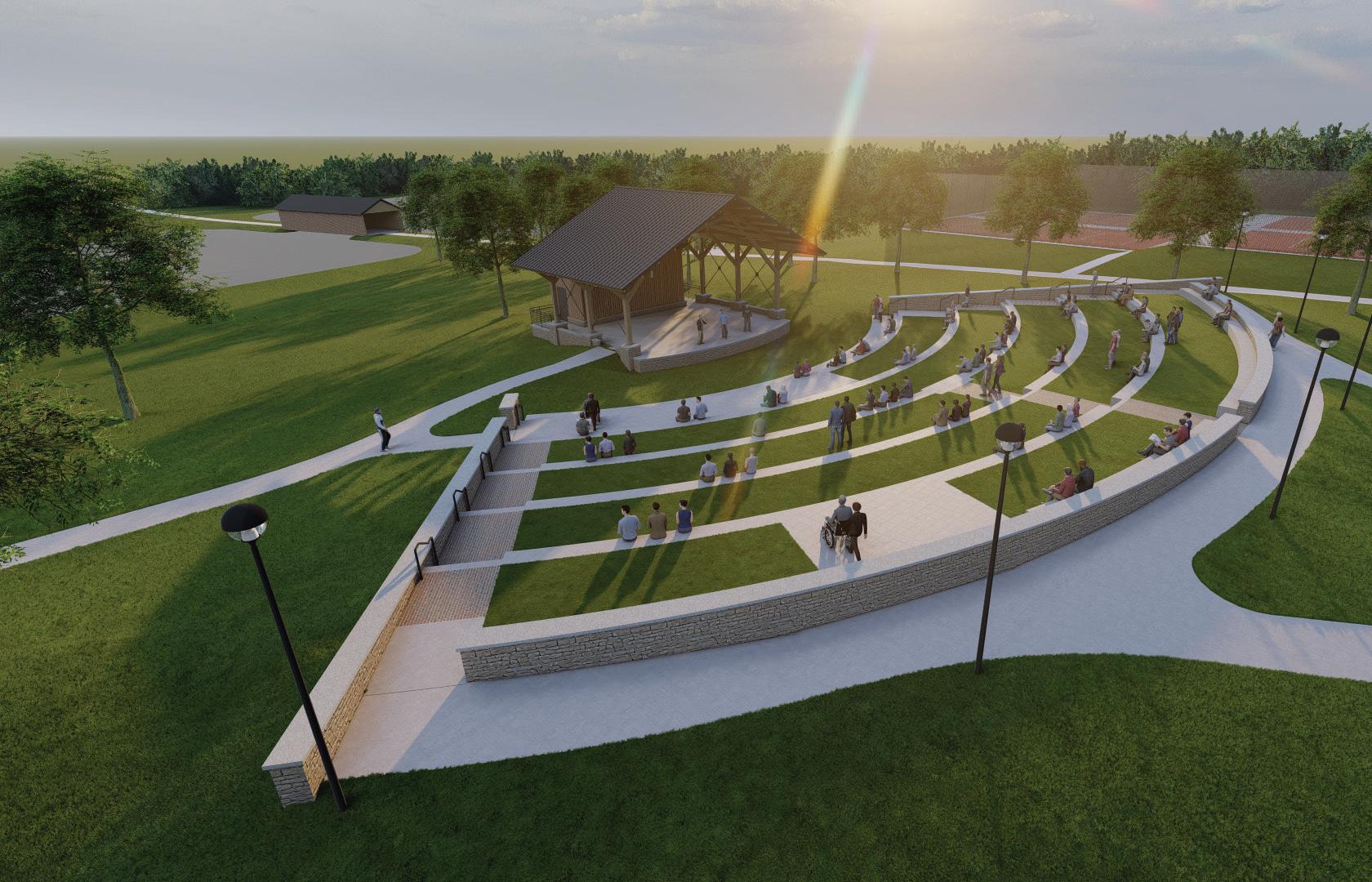
“With more than 600 acres of campus, we want to take advantage of the natural spaces that give students and visitors an opportunity to enjoy the scenic views, and this will be positioned in an area that is heavily traveled but still has an open-air, natural environment that we believe will be very enjoyable.” Plans for the venue are underway, with a broad range of opportunities and accommodations being considered.
“We will be able to hold concerts and performances in the amphitheater, host different types of programming and student events, use it as an outdoor classroom, and several other academic activities. We are grateful for this appropriation from the State of Alabama and the opportunity to add this unique venue to our campus and serve students and visitors for many years to come,” Tucker added.
Construction is expected to take between six and eight months to complete.
Following an extensive site selection process, UWA’s new amphitheater will offer a prime location for outdoor concerts, class activities, theatrical performances and more.
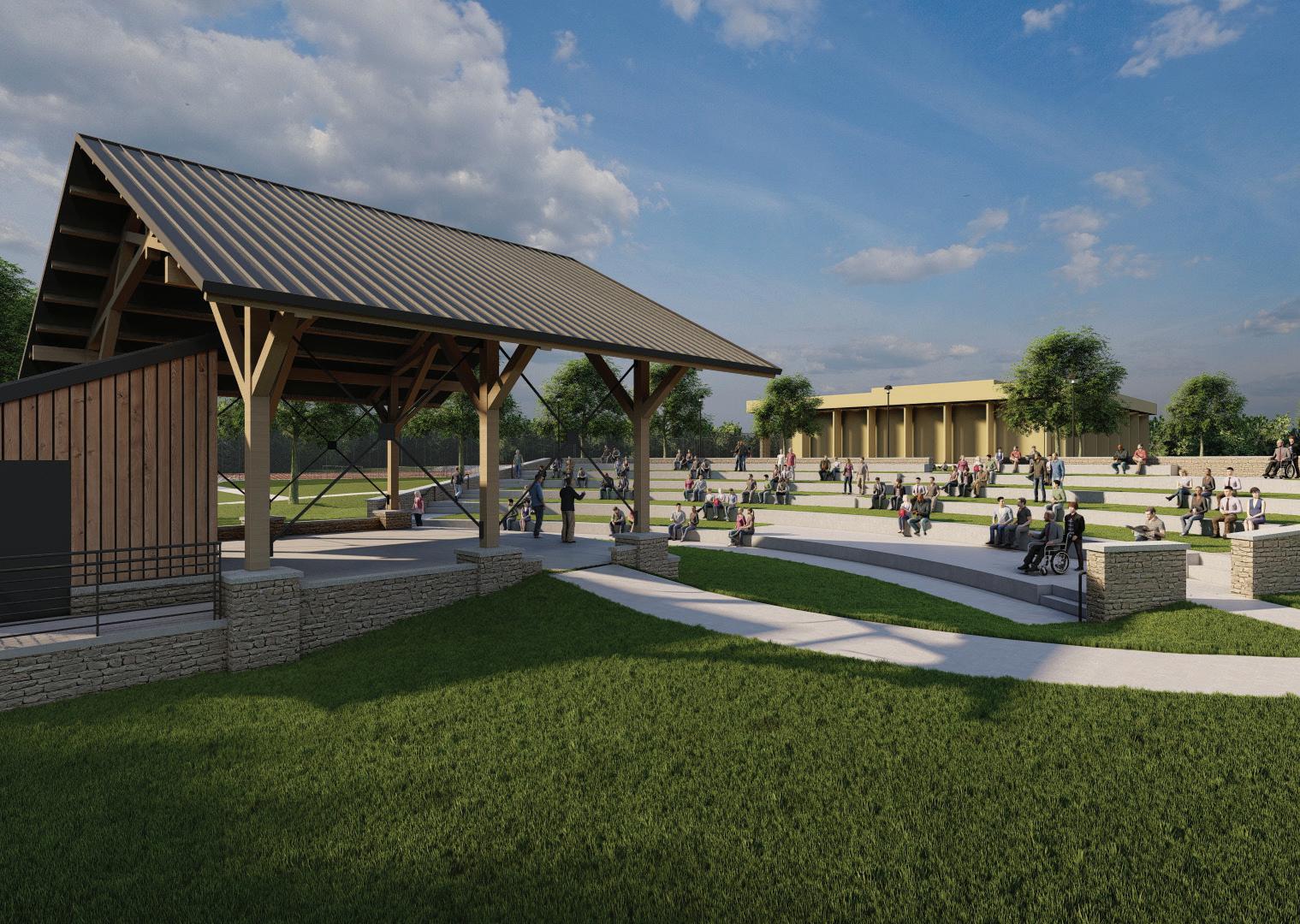

When Dr. Amy Jones, now dean of the College of Liberal Arts, delivered a presentation on the University of West Alabama’s Department of Communications for a state-level awards program, she didn’t go empty-handed.

Along with UWA President Ken Tucker, Jones invited Integrated Marketing Communications student and now-alumnus Demetrius Battle to introduce his portfolio to judges from the Alabama Office of Apprenticeship.
Boosted by Jones and Battles’ presentation and the work of the department’s faculty, UWA’s IMC program received one of the inaugural Governor’s Seal of Excellence in Work-Based Learning awards.
“Frankly, that's an intimidating situation for a college student,” Jones said. “But he did such a phenomenal job. That's what shows (UWA students’) abilities and how ready they are to be successful in their careers. And it was his presentation, I think, that took it to the next level.”
According to the state’s apprenticeship office, the governor’s awards program seeks to recognize the outstanding progress made in work-based learning in order to bring to scale the most effective examples. With its commitment to student internships, UWA’s IMC program allowed Jones to describe it as “a work-based learning model” in her presentation.
The IMC
includes three tracks of study: traditional, graphic
design and sports communications. The traditional track includes upper-level communications, marketing and behavioral-science courses. The graphic design track not only includes its namesake courses but also instruction in photography and media buying. With courses in sports writing, sports magazines and sports media issues, the sports communication track prepares graduates for careers in one of communications’ popular fields.
In the presentation, Jones highlighted vital statistics about UWA’s IMC program, most notably its 332 student internships (260 undergraduate, 72 graduate) coordinated since 2014. Seventy-three percent of the interns worked for Alabama-based companies; 38 percent of the interns earned salaries; and 35 percent of the intern employers hired students after they graduated from UWA. The opportunities came from employers in advertising, marketing public-relations agencies, non-profit organizations, public service and governmental offices, media, sports leagues, education and real estate.
UWA’s application for the award included three letters of support from industry partners and three letters of support from people who had successfully participated in its program, said Jones, who felt it was important to show the judges that UWA’s faculty is adept at answering questions about job placement and skills after
graduation.
IMC majors, she explained, leave UWA with professional resumes that have been edited by faculty members and web-based portfolios that illustrate their potential to employers.
“We know that 47 percent of (UWA’s) student population identify as first generation,” Jones said. “They feel a tremendous amount of pressure to be successful after they graduate from college, and many of them lack confidence transitioning from college to the workplace. It’s something that we see in our graduating seniors.
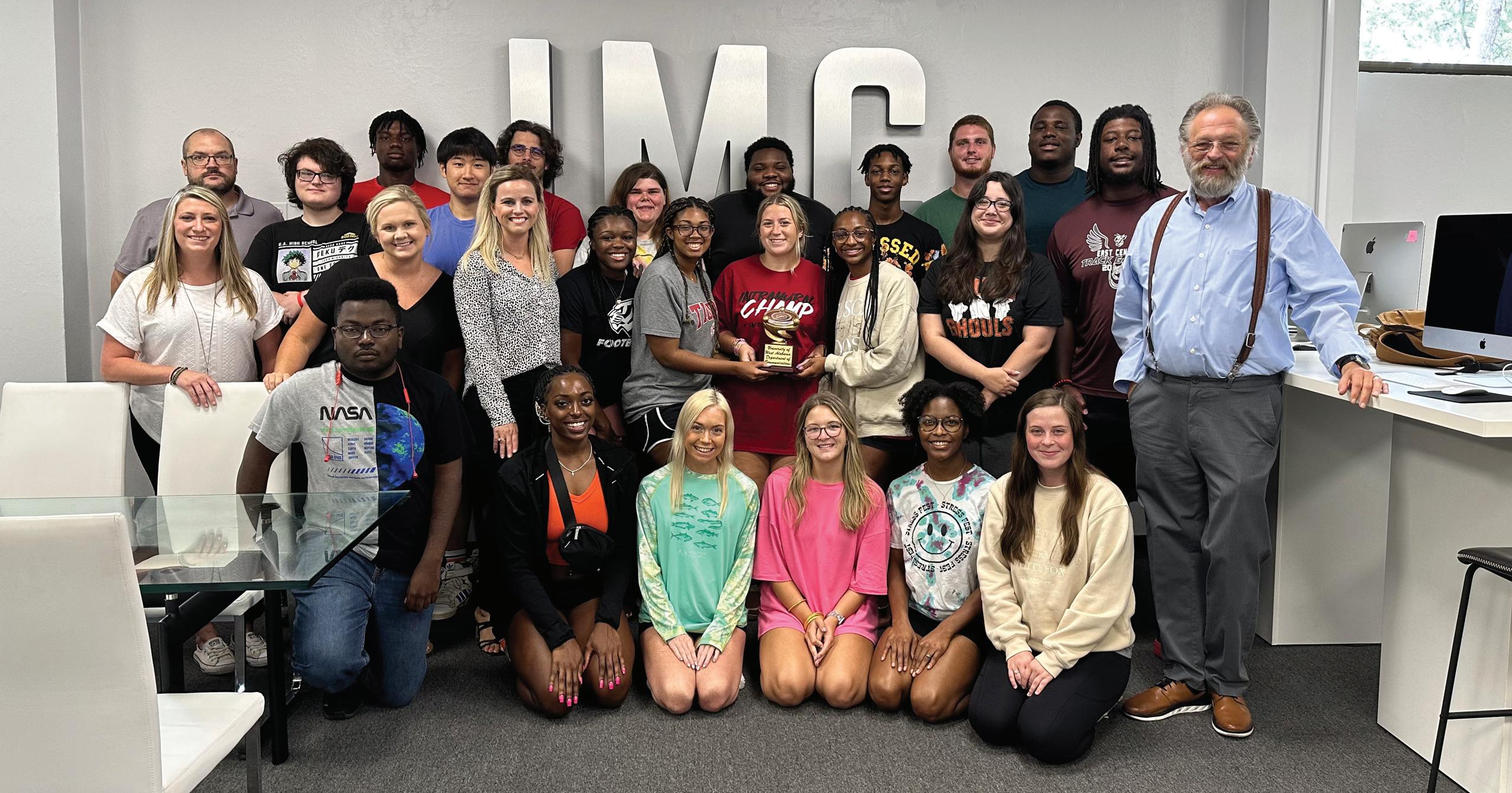
“They’re not just going to college for the knowledge. They’re going to college to be successful in that next level, and that next level for them is their career.”
But in what field? In what job? It’s common for visiting students interested in UWA to ask about employment possibilities for IMC majors, Jones said.
“We have a wonderful team of faculty that all feel strongly about helping our students prepare for their careers,” she said. “And we have been able to build that into every course that they take.”
Upon hearing that she’d won the University of West Alabama’s most prestigious faculty award, Dr. Amanda Pendergrass walked to the lectern and addressed the commencement crowd.

Her first words focused on people she holds dear: her students.
“I am absolutely honored that I get to be a part of your special day where you all are being honored and you took the time out to honor me,” she said.
Pendergrass, an associate professor of early childhood education, received the William E. Gilbert Award during one of UWA’s May 5 commencement exercises. Given annually by the student body, the Gilbert Award recognizes outstanding teaching and excellence in undergraduate classroom instruction.
“They keep that award super secret, and I was completely mind
blown,” she said. “I thought I was going to fall off the stage. I had no idea.”
Originally from Birmingham, Pendergrass joined the faculty of UWA’s Julia Tutwiler College of Education in 2013 after a 10-year stint as a first-, second- and third-grade teacher in Hoover City Schools. She also worked for a year in Okayama, Japan, teaching English in five different nursery schools—using lessons based on shared reading and math games—and counseling Japanese nursery school teachers.
Fourteen hours and nearly 7,000 miles separate Livingston’s campus from Japan, but Pendergrass’ experience in foreign classrooms changed the arc of her career. It’s central to her professional story. Before going to Asia, she was adamant that she preferred teaching the youngest children. “Little people are where it’s at,” she remembered thinking. But instructing nursery school teachers
and college professors in Japan sparked a thought: What about teaching adults? What if the Japanese educators who were telling her she should earn a Ph.D. and seek a tenure-track teaching position were right?
What if fate delivered her to a college classroom?
“They planted the seed,” she said. “When I got home, I thought, well, what the heck? I love going to school. I’ll go back and I’ll work on a Ph.D.—not because I ever thought I would leave the classroom, but it was just a personal challenge for me.”
Life then moved fast. Pendergrass enrolled in graduate school at the University of Alabama in Birmingham. She met her future husband, whose job grounded him in Demopolis. She earned her doctoral degree, joined her husband in Marengo County, fought urges to remain in elementary school classrooms, joined UWA’s faculty, and started a family.
Beforehand, Pendergrass never envisioned leaving Birmingham or the first-grade classroom. Teaching future teachers at UWA wasn’t part of the plan, until it was.

“When I got that job, that was like God telling me, ‘This is the right move for you,’” she said. “Everything is falling into place.”
UWA’s renowned history as a training school for teachers is embedded in Pendergrass’ appreciation for the university’s College of Education. Though she admits missing her former elementary school classrooms, she admires how UWA’s education faculty sets clear expectations for students and guides them through difficulties that occasionally appear.
“I tell them straight up: ‘This semester is not going to be easy. There will be times when you are going to cry, but that is because it’s a lot of work,’” she said. “But that’s what teaching is, setting those clear expectations. I feel like our department does a great job.”
Because it’s selected by a committee of select UWA undergraduates, the Gilbert Award winner is recognized not only for the technical aspects of teaching, but also for how he or she connects with students. “It is not lost on me, absolutely,” Pendergrass said, given that teaching awards in most K-12 school systems are often picked by administrators.
The Gilbert Award is, by design, different.
“These students are in there with me,” she said. “I pour my heart and soul out, but whatever it is that I give in the classroom, they noticed. I have a soft spot in my heart for all of these students, and they know that I treat them just like my own kids.”

It’s understandable that Michele Graham Bradford unpacks memories of her late brother as if he were sitting beside her, smiling as she speaks. The recollections flow easily, sincere as the summer day is long. “He meant the world to us,” she said, “but every year we find out what he meant to other people, as well. He was just a great man.”
Her brother, Ronald Dra Graham, holds a significant place in the University of West Alabama’s history in large part because of
his efforts to form the campus’ first Greek-letter organization for Black students. Without Graham, who came to then-Livingston University on a football scholarship from Attalla, Alabama, and graduated in 1976, the Iota Theta Chapter of the Kappa Alpha Psi fraternity might not exist at UWA.
Bradford considers her brother a visionary, a large man with mild manners, an intuitive mind and innate leadership skills that transcended sports. Unforgettable, in other words. “If you
followed his life,” she said, “you can see that he was a visionary.”
To honor that legacy, UWA’s Kappa Alpha Psi chapter has renamed its recently created student scholarship as the Ronald Dra Graham Scholarship and selected its first recipient—UWA freshman Hailey Hill, a nursing major from Louisville, Mississippi. She will receive a $2,000 scholarship for the 2022-23 academic year.
“I came here for Preview Day and I loved it,” said Hill, who wasn’t aware of Graham’s UWA legacy until she met his family during homecoming activities in October. “I just loved how small it was. And being that I'm kind of introverted, I really thought it was a great fit for me.”
The Graham Scholarship’s origin at UWA traces to conversations between Kappa Alpha Psi members interested in furthering the fraternity’s national tradition of giving back to the community, said Dr. Charles Woods, a two-time UWA graduate who is a professor of biology at Miles College and chairs its Division of Natural Sciences and Mathematics. Woods said he and many of his fraternity brothers consider UWA as a “foundational point” in their professional careers, hence the award’s original name, the Legacy Scholarship.
“From a fraternity perspective, because we are a service organization, we want to try to create an avenue where we can assist young students,” Woods said. “We're very inclusive; we don't have any restrictions on the scholarship. We want a way to help defray the cost of education. We always talk about the importance of putting things in order to help the next generation.”
That spirit of assistance isn’t lost on Dr. LaJuan Hutchinson, an associate professor of sport management at UWA and a Kappa Alpha Psi member who serves as the fraternity’s campus advisor. He’s quick to mention the national organization’s birth at Indiana University in 1911, marveling that those students endured the process of starting a fraternity for Black males decades before the civil rights movement.
“There were often times when being in the fraternity could have been a negative because it is a historic fraternity and it's established to better the lives of African-American males,” Hutchinson said. “It wasn't always an open door to start, but we did get the chapter here and it's been established since that time and we want to give back. The scholarship is to help students going forward, male or female.”
Nearly five decades after the founding of UWA’s Kappa Alpha
Psi chapter, stories still resonate about Graham’s unrelenting commitment to convince his teammates and others to join his effort. Bradford, who graduated from then-LU in 1977, remembers how her brother’s positive reputation soothed opposition to the chapter’s start, especially from the Tigers’ football coaches. Getting certain people to “buy into” the notion of a Black greek organization in the mid-1970s was not easy, she said.
“The (football) staff and those in power at that point have to have had some respect for him and the guys that came to them, because if not, they would not have allowed it,” Bradford said. “They had respect for Ronald because he was someone everyone could get along with. He crossed all lines.”
Kappa Alpha Psi member Harold Goodman, one of Graham’s teammates, recalls that the Tigers’ coaches of that era “were completely against it because they thought we were going to be cut out of the same mold with the other fraternities, just partying and drinking beer all the time. But that's not what we were about. That wasn't our reason for wanting to start it.” Graham and other Black students not only wanted to create an organization embedded with positivity, they also wanted something they felt they didn’t have in Livingston.
“The main thing is that as black students, we just didn't have anything to do on campus,” Goodman said. “That's why we started it, because we just needed something to do. We needed an organization … We wanted to have a college life experience, also. And it brought a lot of joy to people because we work hard.”
With Graham playing the leading role in making that happen, Woods said, UWA’s Kappa Alpha Phi chapter assumed a critical role for the increasing number of Black students on campus—a direct link to the national organization’s founding at Indiana. Today, there are 13 greek-letter fraternal organizations on UWA’s campus, including eight that are traditional African-American organizations. “The fraternity itself became a social outlet for those persons of color, especially young men, to bond around a common interest, and that was to get an education, to make changes in your community, and to also give back,” Woods said.
After graduating in Livingston, Graham embarked on a lengthy career as a coach and educator at high schools in Georgia and in Alabama. Officials in Talbotten, Georgia, where Graham enjoyed a successful run as football coach, renamed the stadium there in his honor. He also served as an assistant coach at Fort Valley
(continued on next page)
State University and several elected terms as a Marion County commissioner in Georgia. He retired from the Board of Education in Terrell County, Georgia, in 2006.
Woods wholeheartedly supported the rebranding of the chapter’s scholarship because of Graham’s reputation. Woods ticks off what he’s heard: that Graham was a dedicated family man, a splendid educator, an outstanding coach. “I’m glad the decision was made to honor him,” Woods said.

Goodman’s recollections of his teammate and fraternity brother are peppered with stories from their careers at Georgia high schools. He credits Graham for helping him getting his first job in Georgia. He praises Graham for not hesitating to pick him and his father up after they had car trouble in south Georgia while on a hunting trip. On another day, Graham agreed to drive Goodman to Florida to pick up a car he’d bought. Goodman had given him just two days notice. Graham didn’t flinch, not even when learning they’d have to leave at 2 in the morning. “He was the guy, no matter what you needed, you could always count on,” Goodman said.
In 2007, as Graham’s health failed and he entered the hospital, Goodman visited his old friend. There was so much to discuss, so much reminiscing to do. But Graham, the visionary leader, wouldn’t let the conversation sway into maudlin territory. He remained true to who he was.
“He spent that whole night telling me that I need to make sure that I took care of myself and for me to tell the rest of the brothers that whatever we do, to take care of ourselves,” Goodman said. “That whole time I was with him, he spent that time concentrating on us, trying to make sure that we took care of ourselves … That’s just the kind of person he was.”
The next day, Goodman said, Graham passed away.
If someone today could meet her brother for the first time, Bradford knows what they’d experience. “Your impression would be that this is someone I want to know because he's nice and purposeful, and it's very obvious that he has quite a bit of substance in everything he does,” she said. “That would have been your impression.”
Liza James Howard long ago established her legacy at the University of West Alabama when she became its first Black student in the fall of 1966. The university hasn’t forgotten.
A two-time graduate of UWA when it was known as Livingston University, Howard received an Honorary Doctor of Humane Letters during spring commencement exercises earlier this month. The Doctor of Humane Letters is reserved for those who make significant contributions in their professions and their communities. “I never thought that 57 years after I placed my feet on this campus that I would be standing here today and receiving such an honor,” Howard said.
During the presentation, UWA President Dr. Ken Tucker highlighted Howard’s academic achievements and her twin careers of distinction, first as a teacher at Livingston Junior High School, then as a regional vice president for Primerica Financial Services. Active in several ministries, she hosts a church Bible study called “Iron Sharpening Iron” and has served on the board of the UWA Foundation, the Sumter County Head Start Policy Board, the York City Council and the Sumter County Industrial Development Board.
“The same perseverance and faith that carried her through the challenges, obstacles and barriers of pursuing two college degrees, a busy home life and her work with Sumter County school chil-
dren continues to drive her many contributions to this community and beyond today,” said Tucker, later adding, “Mrs. Howard indeed paved a way for countless generations to follow, and she continues, like iron sharpening iron, to sharpen those around her.”
The Doctor of Humane Letters adds to Howard’s sizeable resume of UWA recognitions. In 2004, she was inducted into the university’s Society of the Golden Key, the highest award given to a graduate or faculty member. A National Alumni Association chapter and its scholarship award open to incoming freshmen from the West Alabama region carry her name. In 2011, UWA dedicated the Liza James Howard Courtyard on the east side of the Math and Science Building in her honor.

In her acceptance speech, Howard urged UWA graduates to begin their adult lives and upcoming careers by positively influencing others.
“You can be a difference-maker, you don’t have to have a big platform,” she said. “You show unconditional love to the people in your environment -- to people who don't look like you, who didn't go to the same school. You encourage that young girl or young boy who look different, who look like they're down and out. Show them love and tell them they can make it. When you do that, you are making a difference.”

may be no better
Young, recently married and rich only in aspirations, the Woodruffs once lived in Monticello, a college town about 40 miles west of the Mississippi River. Nick, a graduate assistant at the University of Arkansas at Monticello, had been promoted to assistant coach of the Boll Weevils’ men’s basketball team. Kristen had a job—in Ohio—but resigned to join her husband’s career dream. Pizzas, it would be.
Mazzio’s Italian Eatery sits a short drive north of the UAM campus, its menu filled with the usual varieties of pizzas, pastas, calzones, chicken wings and salads. Unemployed despite having two college degrees, Kristen couldn’t ignore the paycheck and, as Nick remembers, began “flipping pizzas and bringing dinner home.”
“She was a big part of letting me coach, and now I've kind of finally helped out by getting this job and doing pretty well. But she carried us for a while.”
Today, the Woodruffs are nearly a decade into their time in Livingston. Kristen is the quality assurance director for UWA’s Division of Online Programs, which features more than 50 online
offerings. Nick is head coach of the men’s basketball team, which this season shared the Gulf South Conference regular-season championship, won the GSC tournament and qualified for the NCAA Division II playoffs.
Together, this husband-and-wife team of Midwest transplants is a visual constant on the UWA campus, where their embrace of the university’s mission, its students and its athletics programs are well known.
“They are just an unbelievable power couple. It’s like Brad (Pitt) and Angelina (Jolie), and we've got Kristen and Nick,” said Dr. Jan Miller, dean of UWA’s College of Education and the Division of Online Programs. “They both are just the most humble people you'll ever, ever see. Nothing really ruffles their feathers. They're cool as a cucumber. I think the world would be an awesome place if we had more Nick and Kristen Woodruffs in the world, for sure.”
Long before Livingston and Monticello and the pizzas at Mazzio’s,
Kristen and Nick grew up in Oxford, Ohio, a city tucked into that state’s southwest corner not far from Cincinnati and the Indiana state line. They went to the same high school. Both played sports. Nick took Kristen to the homecoming dance. One of Kristen’s brothers—she’s the second-oldest of her parents’ nine children— married one of Nick’s best friends. Their pasts overflow with connective snippets.
Oxford is permanently embedded in their DNA. Like Livingston, it’s a college town, home to Miami University, one of the nation’s oldest public institutions of higher education. Nick’s mom worked nearly two decades as a secretary in that university’s football recruiting office. One of Kristen’s brothers played football at Miami. As an eighth-grader, Nick job-shadowed Miami’s basketball coach, which became tinder for his burning desire to become a coach.
At Talawanda High School in Oxford, Nick played guard for the basketball team. Kristen, initially tall for her age, was a post player in middle school but moved to guard. “I’ve always loved basketball, but I wasn't as good of a player as Kristen was,” Nick said. “She was the player, I just have a mind for it.” They sheepishly agree that if they played one-on-one today, she’d probably win.
Rather than attend Miami, Kristen and Nick embarked on an unofficial tour of southern Ohio’s universities. Nick graduated from Muskingum University in Zanesville. At Capital University in suburban Columbus, Kristen earned a bachelor’s degree in organizational communications, played basketball and justified Nick’s opinion of her on-court talent. She left that campus with a stellar resume: four-year letter winner, three-time team captain, twotime Ohio Athletic Conference first-team selection, and the 2010 conference player of the year. Still hooked by basketball’s allure, she spent two years as a graduate assistant at Otterbein University in Westerville, where she earned a master’s degree in business administration. Coaching, she eventually realized, was her husband’s future, but not hers. Their interconnected lives, forever rooted in Ohio, were about to take them south.
“You miss the people, and you miss your family,” Kristen said. “But I'll be honest, if I never see snow again, I'm good with that. The weather here is much better.”
At UWA, the Woodruffs work in roles that couldn’t be more divergent, one academic, the other athletic. As a 35-year-old head coach of a successful NCAA Division II team, Nick is a public figure intrinsically linked to UWA. Kristen enjoys much more anonymity, though Miller is adamant that the wife of the basketball coach can’t hide from the university’s online success. Chief among
that adulation is Kristen’s role as the liaison between UWA and the partner organization that provides enrollment management and marketing efforts for the online programs.
“She is the MVP of online programs,” Miller said. “She is our dayto-day, behind-the-scenes person who makes sure the processes on the partner’s side and UWA’s side run seamlessly. It is the most well-oiled machine you've ever seen.”
For the former all-conference basketball player, that administrative role is different from what Kristen first expected when she decided to avoid a career in coaching. With degrees in communication and business administration, she envisioned roles in athletics administration or communications for a sports television network. But Nick’s career journey, as it often would, rewrote that script.
As a profession, coaching is often a nomadic slog. Coaches move for promotions and higher pay. Unemployed coaches move because they need a job. When Nick’s career began in earnest at Arkansas-Monticello, Kristen’s career flourished when the Arkansas Small Business and Technology Development Center hired her as a consultant and training coordinator. It was neither coaching nor athletic administration. Not only did the ability to assist Arkansas’ rural communities resonate with her, it justified the decision to eschew sports and embrace a career in business.
“I fell in love with that,” she said. “I really enjoyed it.”
The Woodruffs wouldn’t stay in Arkansas long. Nick’s career, the one that began on the basketball courts in Oxford, wouldn’t allow it. When UWA hired the head coach at AUM, Allen Sharpe, Woodruff also joined the Tigers’ coaching staff. The moves didn’t rankle Kristen. She had played college basketball. She knew how the system worked, that coaching families moved as often as military spouses, and that work-life balance was nevertheless possible. She was nonplussed.
“I knew what I was getting myself into because it's all-encompassing,” she said. “I think that's why part of me knew that coaching is not for me, but being a part of basketball is because that competitive drive is still there.”
Nick embraces the lifestyle—the late-night film studies, the grueling recruiting travel and the 24-hour, seven-days-a-week schedule. He scoffs at any thought of doing something else, something less stressful. “Coaches talk about the grind. This is not a grind,” Nick said. “I don't go to the coal mine. I don't go to the paper mill at 4 a.m. I get to work coaching. I get to do my hobby for a living.”
(continued on next page)
Kent Partridge, UWA’s director of athletics, considers Nick the embodiment of his department’s historic culture of hard work and success.
“Nick is a ‘ball coach,’ not concerned with much of anything else going on outside of his family and his team during the season,” said Partridge, who praises his coach’s tunnel-vision mentality. “Fifty-plus wins over the last two seasons proves that.”
It doesn’t take Kristen long to count the number of UWA games she’s missed since Nick replaced Sharpe as the Tigers’ head coach. It’s two. That’s it. One last year, one this year. The Woodruffs’ children, Steven, 7, and Sloane, 4, are courtside constants. If you ask Kristen how many children she and Nick have, she might say 12— or more—because of the relationship her family has with the Tigers’ players, many of whom also are far from their childhood homes.

Steven, his parents say, is a mini-Nick—all sports, all basketball, all the time. He can’t get enough. In fact, Partridge describes Steven as “the pied-piper for every kid in the gym, leading every halftime shooting session and making sure all his buddies know our players.” But Sloane isn’t as impressed by her dad’s job. At a recent UWA postseason game in Birmingham, Sloane slept in her
mother’s arms for most of the night. When she woke up late in the second half, she asked, “When are we going back to the hotel?”
“She doesn't have a care in the world about if he wins or loses,” Kristen said.
When Miller, dean of education and online programs, describes the Woodruffs, she quickly mentions the respect Kristen and Nick have for their respective positions at UWA. During the day, they aren’t joined at the hip while on campus. Professional boundaries matter. “He is supportive of the job that she does and he understands the importance of the role that she plays,” Miller said. “I rarely see Nick over here in the College of Education and online programs. And I bet they rarely see Kristen over (in athletics) unless it's for a game. But they support each other 100 percent. It's just the coolest thing.”
That collegial spirit on UWA’s campus is invaluable, the Woodruffs say, especially for a coaching family with young children.
“It's a privilege to work here, first and foremost,” Kristen said. “And there's a community here that is our friends. They help us figure this out. It's not just the two of us. We're not on an island. We've got a community of supporters.”
The University of West Alabama has named alumna Banks Gordy as the new director of Alumni Affairs. A two-time graduate of the University, Gordy will lead alumni engagement efforts including chapter development, a schedule of alumni networking opportunities, special recognition programs, and alumni scholarship initiatives.

Gordy comes to the Office of Institutional Advancement from the College of Education, having served as coordinator for the UA/UWA Inservice Education Center since 2019. Gordy joined the UWA staff in 2014 in the Office of Public Safety in an administrative support role for UWA Police Department. She supported the College of Education’s Project REP as an administrative assistant and then program coordinator. Prior to joining the University staff, she was a classroom teacher in two west Alabama elementary schools.
Gordy earned a bachelor of science in elementary education in 2003 and a master’s in 2022. In addition to her role in the College of Education, Gordy has also served as director of the Sumter County Chamber of Commerce since 2021, developing and implementing strategies to support membership, financial goals, and annual operations of the Chamber.
“It is such an honor to have the opportunity to serve my alma mater and fellow alumni in this role. I have a deep love for this University and the west Alabama region. I look forward to connecting with alumni to help strengthen our programming and engagement in so many areas while helping to make them proud to be connected to the University.” -
BANKS GORDYThe UWA National Alumni Association supports academic excellence, best interests, and traditions of the University of West Alabama. Support for the NAA allows us to provide engaging and enjoyable alumni gatherings and events and helps build scholarship opportunities for students to attend UWA.
As fall arrives on the University of West Alabama campus, Dr. Reenay Rogers and her College of Education colleagues expect their newest endeavor to be worth the excitement it’s generated for several months.
Spurred by a $3 million grant from the Alabama STEM Council, UWA is developing a new program, called UWA Teach, that is designed to improve the quality of science and math instruction and the number of teachers for STEM classes in the state’s K-12 public schools. Shortening the teacher certification process for UWA education students is one of the program’s key components.
“It's going to do a lot for us,” said Rogers, associate dean of UWA’s College of Education. “Hopefully, we'll be putting more teachers into the field at a faster rate. The great thing about this grant is that it opens up teacher certification to all STEM majors.”
Through an executive order, Gov. Kay Ivey created the Alabama STEM Council in 2020 in response to recommendations from the Governor’s Advisory Council for Excellence in STEM. In its report, “Alabama’s Roadmap to STEM Success,” the advisory council determined that “at an overarching level, Alabama lacks a common vision to expand and weave our individual initiatives, resources and expertise into a coordinated STEM education network providing the workforce pipeline essential to the future of Alabama’s economy.”

As a result, the state’s STEM Council awarded $3 million grants in December to six public institutions: Alabama A&M University, Auburn University, Auburn University at Montgomery, Athens State University, the University of South Alabama and UWA. Previously, the University of Alabama at Birmingham housed the state’s only UTeach program.
With these grants, the universities will design programs to boost the number of teachers for STEM-related classes and streamline ways for students majoring in STEM programs to earn teacher
certification. Addressing the state’s significant teacher shortage is paramount, according to the Governor’s Advisory Council.
“The shortage of teachers in general is across the nation, and the shortage of math and science teachers is even greater,” Rogers said. “If you add on the shortage of math and science teachers teaching in rural areas in Alabama, we're talking about some schools that don't have certified teachers at all in math or science.”
State officials’ expectations for these grants are lofty -- the creation of as many as 530 additional “highly qualified” STEM teachers for Alabama schools during the grants’ five-year lifespan, with a goal of training and graduating more than 250 STEM teachers annually once the grant period ends.
“UWA has produced a significant majority of educators in the State of Alabama for quite some time, and we are eager to strengthen our institution’s ongoing response to the teacher shortage that exists nationwide, but especially the teacher shortage in Alabama,” said UWA President Ken Tucker. “We are grateful for collaborative efforts facilitated by the Alabama STEM Council and the support it provides to help us to more effectively meet our region’s needs and continue building the foundation for a prosperous future for our fellow Alabamians.”
College of Education Dean Jan Miller estimates that approximately 95 percent of UWA’s certified teacher education graduates stay in Alabama classrooms.
The UTeach program began in 1997 at the University of Texas at Austin and is used nationally as a guidepost for similar efforts. According to Gov. Ivey’s advisory council, the Texas program is designed to give math and science majors who want to teach “research-based, clinically intensive teacher preparation and continued support in their early teaching careers.” Additionally, (continued on next spread)

the teaching careers of Texas’ UTeach program graduates are on average longer than their peers, and UTeach graduates “outperform their peers in science and math achievement,” the advisory council wrote.
Administrators at Texas’ UTeach Institute and the Alabama Commission on Higher Education, which is managing the grants, will assist UWA and the other universities with development of their programs.
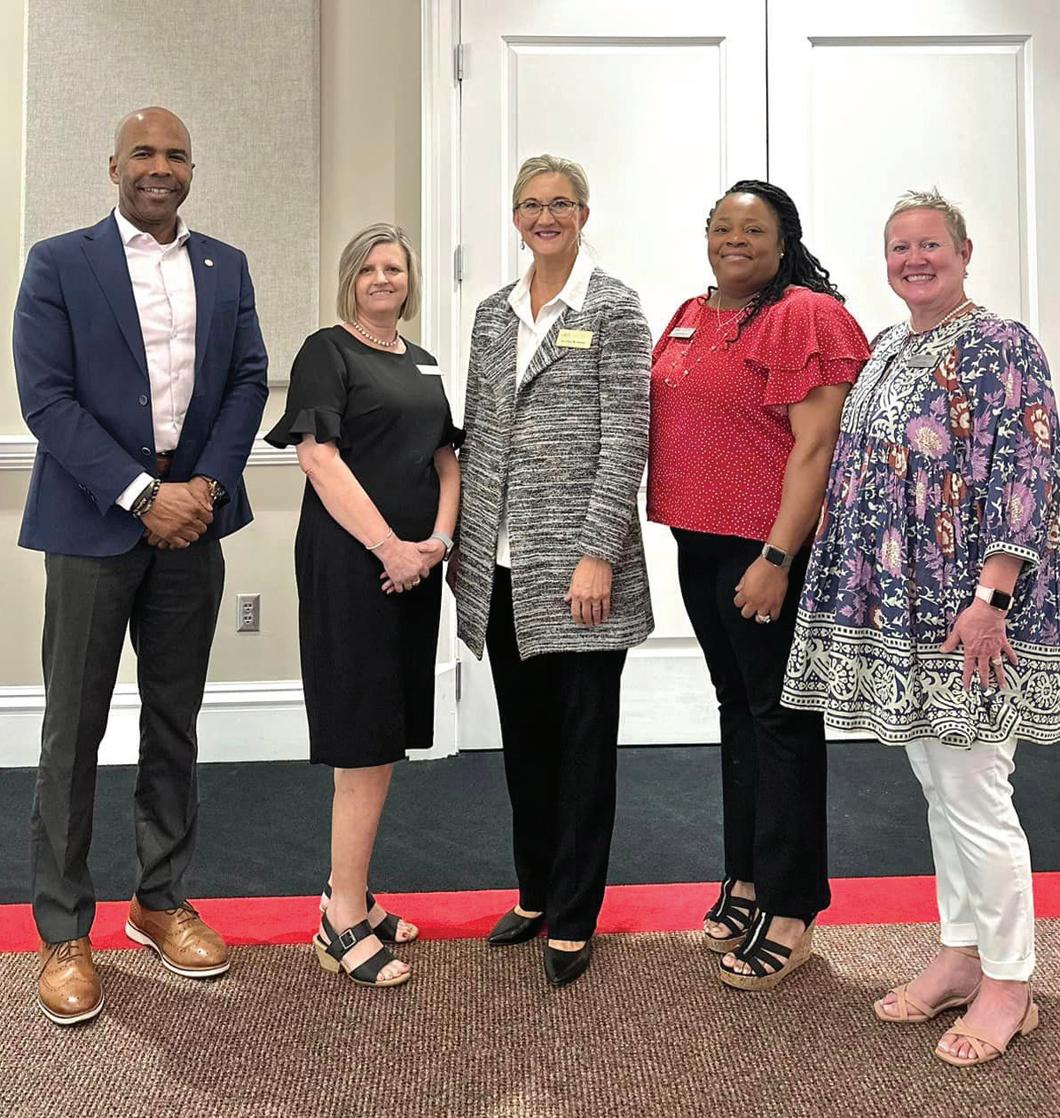
In a proposal document for UWA Teach, university administrators noted that nearly half of Alabama’s public schools (45 percent) are considered rural, which unequally exposes them to teacher shortages. That’s an important consideration for UWA, its administrators wrote, which has a reputation for “pioneering a doctorate in rural education, developing a Center for Rural Education, and serving as the southeastern hub for the Rural Schools Collaborative.”
In its 2019 roadmap document, the governor’s advisory council presented a wider view of the state’s STEM needs in education and economic development and noted academic deficiencies in math and science among Alabama’s K-12 students. Alabama will need more than 850,000 STEM-related jobs by 2026, the council projected, but may not have enough qualified applicants. “Significant educator shortages make it difficult to recruit, train and retain well-qualified educators equipped in the methods of a modern STEM classroom,” the council wrote. Additionally, “STEM teacher shortages primarily affect minority and low-income communities.”
Rogers is ecstatic about the impact UWA Teach will have in Livingston and for graduates who will benefit from mentoring efforts during their first year in the classroom. The tangible advantages are numerous.
“It focuses specifically on how to teach math and science, whereas right now (students) get one class in methods of teaching math or science,” she said. “These courses are all geared towards that, with all of the educational foundation information interwoven into the curriculum.”
The curriculum that UWA’s College of Education will develop in upcoming months should appeal to any student in a STEM-related major who “would be eligible to essentially get a minor in STEM teacher certification,” she said.
Rogers’ path to becoming a teacher is instructive to the value of this infant program. She holds two advanced degrees from the University of Alabama: a Ph.D. in Instructional Leadership with
emphasis in instructional technology and a master’s degree in Secondary Education Comprehensive Science. Her bachelor’s degree at UA was in microbiology, which caused her to take what she calls an “alternative route” for teacher certification. That lengthened the process.
With UWA Teach, STEM students who want teacher certification can benefit from a streamlined approach by choosing their preferred major and simultaneously earning teacher certification. The number of hours required for an undergraduate degree likely wouldn’t increase, Rogers said.
“That way, I would graduate with my microbiology degree, and if I had a job working in that field, that's fine. I could pursue that,” she said. “However, it would open up the (teaching) option to pursue.”
College of Education administrators also plan to include alumni options in UWA Teach. Rogers envisions graduates with science or math degrees who haven’t found their desired jobs taking advantage of a shortened certification process.
“I think it will create a more rigorous pathway for math and science (teachers), but also our teachers will come out better prepared and knowing how to teach math and science,” she said.
“That’s why it is a very unique curriculum.”
The University of West Alabama would like to thank the following generous donors for their gifts and pledges from October 1, 2022 to July 31, 2023
$10,000
Andrew L. Coats
Anonymous
Ascension
ATI Physical Therapy
Bryant Bank
Coca-Cola Bottling
E. L. Cain
Elizabeth C. Liver Trust
Gregory O. Snow
Hal W. Bloom
Jim H. King
Mary L. Rosenbush
Micky Smith
Snipes Family Scholarship Fund
ST Bunn Construction Co.
Steven Campora
Sumter County Fine Arts Council
Terry Bunn
$2,500 - $9,999
Alabama Road Builders
Alton S. Lewis
Brent W. Bumgarner
Brian Ferris
CAF America
Cynthia Kozlowski
Faye Waddell
Gaddy Electric and Plumbing, LLC
Gary Rundles
James A. Holmes
J.J. Wedgworth
Justin G. Plant
Kelsey Ferris
Ken Tucker
Kyle Edmonds
Matt A. Gurley
MMR Constructors, Inc.
Prystup Packaging
Star Printing Company, Inc.
Sumter County Farmer's Federation
The Westervelt Company
Two Rivers Art Council York Ice Co.
$500 - $2,499
Alabama Power Foundation, Inc.
Alabama Wildflower Society
Amanda Gilliland
Amanda P. McRae
Amy Jones
Andrea A. Farquhar
Andrew D. Rabun
Anthony Crear
Barbara Sims
Beverly D. Hailey
Big Mike's Restaurant, LLC
Black Belt Land and Realty, Inc.
Bobby Johns
Boone's Pharmacy, Inc.
Brad Hamner
Bradford Agriculture, LLC
Brandon Powell
Bratton Automotive, Inc.
Brenda E. Edwards
Butch Larkin
Byron B. Thetford
Caldwell & Dean, LLP
Carlderon A. Stewart
Carmen Felus
Carrie Tullos
Carson City Toyota
Charles C. Woods
Charles H. Johnson
Charles Leverett
Christi L. Wade
Christopher N. Thomason
Clarke Prep
Clemit W. Spruiell
Clete Beard
Curtis Outlaw
Daniel F. Poole
David Cowart
David Hawley
Dennis J. Bragg
Diamond Jim's and Mrs. Donna's
Diesel Pickup Specialists
Donald Jefferson
Douglas Boyle
Estate of R. Knight
Evan Wedgworth Equipment, LLC
Fayetteville School
Fletcher R. Boulware
Frank K. Pinkerton
Graeme D. Orr
Greg Webb
Henry F. Walburn
Holiday Cleaners
Investar Bank
Jack Crowe
Jackie L. O'Neal
Jackie M. Carpenter
James Berryman
James Lamons
Jean D. Anderson
Jean R. Creswell
Jerry F. Smith
Jerry K. Hogan
Jerry L. Vincent
Jimmy D. Collins
Jocobby Robinson
John D. Crawford
John D. Lundeen
Joni R. Maddox
Joseph Clayton
Joseph Lewis
Julia B. Spree
Kathleen E. McKeon
Kathryn P. Gilliland
Kay Bunn
Keith D. Bullock
Kelly Stephens
Kent Partridge
Law Office of Jennifer J. Tompkins
Lee B. Boydstun
Mac Lambert
Marci Carder
Martha D. Hildreth
Mary Grace P. Edmonds
Matthew G. Linder
Matthew L. Lavender
Melissa Haab
Melvin S. Williams
Michael A. Maddox
Michael E. Burkett
Mickey Andrews
Mike Davis
Mike Morrison
Mike Sullivan
Mitzi Green
MP Products
Naheola Credit Union
Nick Woodruff
Norman E. Waldrop
Parker Kennels
Patrick W. McGahey
Phi Mu Sorority
Phoebe Waddell
Planters Bank & Trust Company
Polly M. Raymond
Poole Electric & Control Services
Randall E. Brooks
Rebecca R. Hall
Richard T. Hester
Robert C. Beard
Robert G. Upchurch
Robert Leo Wright
Robert Wallace
Ronnie Chu
Russell D. Cram
Samuel D. Beck
Sheila Paparella
Short Cuts Lawn Care Services, LLC
Smith Service
Sumter Agencies, LLC
SunSouth
Tandem Technologies International, Inc.
Tanzie Brown
Tavis Enterprises, LLC
Terri Olive Tompkins
Terry Stewart
The Health Care Authority for Baptist
Thomas D. Buckalew
Thomas M. Harwell
Thomas M. Morrison
Tim Edwards
Tim Parkman
Tina N. Jones
Tom Perry
Tombigbee Healthcare Authority
Virginia S. Hester
Watkins Cross, LLC
Wendell A. Larkin
West Alabama Bank and Trust
William F. Washburn
William Hill
William J. Pitts
William M. Spencer
York Drug, Inc.
CONTRIBUTORS: Tax receipts for gifts to UWA are not sent to donors on an annual basis. As per Internal Revenue Service laws, your thank you letter from the University will serve as your receipt. If you wish to have a detailed summary of your gifts, please call 205-652-3552.
The University of West Alabama would like to thank the following supporters who have shown an exceptional level of continued generosity through a lifetime of giving to the institution.
$1,000,000 OR MORE Anonymous
Anthony W. Hughes
Community Health Systems, Inc.
Steven Campora
William Hubbard
PRESIDENT’S SOCIETY
$100,000 - $999,999
Alabama Power Company
Alabama Power Foundation, Inc.
Alexander J. Saad
Alton S. Lewis
Andrew L. Coats
Aramark, Inc.
Ascension
ATI Physical Therapy
Bank of York
Bart Booker
BCES Foundation
Bryant Bank
Carl and Gretchen Sudduth
Chemical Waste Management
Ciba Specialty Chemicals McIntosh
Clemit W. Spruiell
Coca-Cola Bottling
E. L. Cain
Elizabeth C. Liver Trust
Eugene Pettis
Grandview Medical Center
Investar Bank
James Suttles
Jason D. Green
Jerry F. Smith
Jim H. King
John Pritchett
Ken Tucker
L.G. Cunningham
Lucille A. Andrews
Mary T. Roden
Mike and Gillian Goodrich Family Foundation
Myrtle Ford
Nellie R. McCrory
Physiotherapy Corporation
R.T. Floyd
Rebecca G. Holland
Regions Bank
Regions Foundation
Richard D. Holland
Robert Buccola
Roland Pugh Investment Fund
ST Bunn Construction Co.
St. Vincent's Hospital
Steven Ginzbarg
Sumter County Nature Trust
The Daniel Foundation of Alabama
The Ernestine L. Lenoir Charitable Trust
The Westervelt Company
Violet M. Reed
William W. Taube
Alabama Black Belt Foundation
Alabama Historical Association
Alabama Land Title Company, Inc.
Anthony Beard
Asa N. Green
Aubrey W. Ellis
Barnes & Noble College
Benjamin S. Powell
Betty Vaughan
Big Mike's Restaurant, LLC
Bobby T. Williams
BREF Bahamas, LTD
Bruce M. Sims
Charles H. Johnson
Charles McDaris
Ciba Specialty Chemical Corp.
City of Livingston
David M. Wilder
Diamond Jim's and Mrs. Donna's
Don R. Nixon
Donald R. Pugh
Earlene Lindsey
Emerson and Barbara Kampen Foundation
Evan Wedgworth
Flowers Hospital
Foley Hospital Corporation
Gary Rundles
GCB ENT
George W. Skipper
Glen W. Bridges
Greenetrack, Inc.
Gregory B. Saad
$25,000
Hal W. Bloom
Howard Holt
James A. Holmes
James L. Bonner
Jay C. Long
Jewell V. Averyt
Joe D. Moore
Joel R. Hillhouse
John P. Moore
Julian M. Ennis
Justin L. Smith
Kelly Stephens
Lathrop W. Smith
Law Lamar
Lewis A. McLean
Linda A. Carr
Livingston Auto Parts
Livingston Drug Store
Livingston Stockyard
Marcus E. McConnell
Margaret S. Noland
Maria R. Suttles
McDonald Family Foundation
Michael M. Davis
Micky Smith
Minnie W. Sanders
Naheola Credit Union
Nell Manusa
Oneonta Redskin Quarterback Club
Patricia A. DeMay
Paul Beard
Paul M. Byrne
Pierce Boyd
Poarch Creek Band of Indians
Prystup Packaging
Ralph Hammond
Ralph M. Lyon
Reaching & Meeting Needs Worldwide Min.
Reese Phifer, Jr. Memorial Foundation
Richard Cross
Richard T. Hester
Robert T. Spree
Robert Wallace
Roland Pugh Construction, Inc.
Roy R. Gavin
Smith D. Boyd
Southwest Paper Sales, Inc.
Summer Classics
Sumter County Farmer's Federation
Sumter County Fine Arts Council
The Gazelle Group, Inc.
Thomas D. Buckalew
Thomas J. Tarleton
Thompson Foundation
Tractor & Equipment Company Foundation
Tuscaloosa Credit Union
Walburn Family
Waste Management
West Alabama Bank and Trust
WestRock
William M. Spencer
William A. Lunsford
Winton E. Wise
Wright Weight Equipment, Inc.
York Drug, Inc.
Totals reflect cumulative giving through July 2023
- $99,999
Livingston Legacy Society recognizes those who have made a gift to the University of West Alabama through a will or trust.
The society of friends help drive the University’s mission while allowing generosity to support the causes that our supporters care about most.
Alexander J. Saad
Anonymous
Anthony W. Hughes, Jr.
Anthony W. Hughes, Sr.
Carl W. Sudduth
Caryl Nixon
Donald R. Pugh
Eugene Pettis
Jason D. Green
Jerry F. Smith
John C. Pritchett
Julian M. Ennis
Ken Tucker
L.G. Cunningham
Lucille A. Andrews
Marcus E. McConnell
Maria R. Suttles
Paul M. Byrne
R. T. Floyd
Violet M. Reed
William A. Lunsford
William Hubbard
Winton E. Wise
Membership reflects planned gifts to the University of West Alabama through July 2023. If you too, have named the University in a bequest, beneficiary gift, gift of stock, charitable iRA rollover, donor advised fund, or gift of life insurance, please contact the Office of Development to notify the staff of your generous intentions.

HOLLY NEEL (B.A., ’96), a teacher at Hernando High School in Mississippi, was honored as teacher of the month in September 2022 by the Hernando Rotary Club. Neel previously worked for the University of Memphis’ distance-learning program and at Southaven High School in Mississippi.
LARON WHITE (M.ED., ’11), a longtime high school teacher and coach, retired from Sparkman High School after six years at that school. White, from Courtland, Alabama, graduated from the University of Alabama and played football for the Crimson Tide from 1993-96. Prior to his tenure at Sparkman, White coached at Tanner High School, where he won Class 2A state championships in 2012 and 2013, and Decatur High School.
DAVID BUTTS (M.ED., ’14), the associate principal at Helena High School, has been named principal at New Direction School in Columbiana. The Shelby County Board of Education approved Butts’ appointment in October 2022. He also holds a bachelor’s degree from Faulkner University.
NICHOLAS FINCH (B.A, ’13) was named in October as the assistant athletics director for compliance, facilities and game operations at Stillman College in Tuscaloosa. Finch, from Toddtown in Clarke County, worked for four years in the UWA athletics department as the primary media contact for UWA several men’s and women’s teams. Prior to working for UWA, Finch was a journalist at the Choctaw Sun-Advocate in Gilbertown and Marengo County’s The Demopolis Times and Blackbelt Gazette
JAMES RUSH (B.S., ’05), vice president of instruction at East Mississippi Community College, participated in the Community College Policy Fellows Program. Program attendees traveled to Washington, D.C., and met with Mississippi’s congressional delegation and staff members of the U.S. Department of Education. A graduation ceremony for the program’s 2021-22 class took place in May. Rush, who earned a bachelor’s degree in Business Administration from UWA, has worked at EMCC since 2007. He earned his Doctor of Philosophy in Higher Education Administration from the University of Southern Mississippi in 2020.
ANDREA DOMIZIO MANESS (EDS, ’20) was named principal of Pike Road High School in Montgomery County. The former principal at Carroll High School in Ozark has 18 years of public education experience and has taught mathematics, served as chair of her school’s mathematics department, and coached cheerleading. Prior to receiving her educational specialist degree from UWA, Maness earned a bachelor’s of science degree in Comprehensive Mathematics Education from Troy State University and a master’s of science degree in Instructional Leadership and Administration from Troy University
Dothan. She is pursuing an educational doctorate from the University of Alabama, focusing on organizational change and leadership within rural education.
CORY HOUSTON (B.S., ‘08; M.S., ‘09) was named coordinator of sports performance for baseball at the University of Houston in June. Houston previously worked as the strength and conditioning coach for the Tulane University baseball team (2016-2020) and as an assistant strength and conditioning coach at Florida International University (2012-2016). At FIU, he handled athletic performance programs for the baseball, softball and women's tennis teams and assisted with the football team. The Columbus, Miss., native interned at Mississippi State University and served as a graduate assistant with the football, baseball and tennis teams (2008-2011). Houston played baseball at UWA from 2005-2008.
BRANDI MCGEE SMITH (B.S., ’12; EDS, ’20) was named principal of Demopolis Middle School by the Demopolis City Schools Board of Education in April. Smith, who played softball at UWA, has taught sixth grade at Hillcrest Middle School in Tuscaloosa and most recently was the assistant principal at Hayden High School in Blount County. She is a 2008 graduate of Demopolis High School.
YVETT ROBY received the Outstanding Service to Crime Victims Award from the Mississippi Attorney General’s Office in April. Roby, director of Mississippi State University's Office of Survivor Support, was nominated by the Mississippi Coalition Against Sexual Assault for her work in MSU’s Office of Survivor Support, where she helps impacted students make the transition from victim to survivor. Roby previously worked in MSU’s Student Counseling Services. Besides her master’s degree from UWA, she holds a bachelor’s degree in psychology graduate from the University of Southern Mississippi and a doctorate in instructional systems and workforce development from MSU.
LES STUEDEMAN received the Title IX Trailblazer Award in April from the University of Alabama in Huntsville Office of Diversity, Equity and Inclusion. Since becoming UAH’s first softball coach in 1995, Stuedeman has led the Chargers to 13 Gulf South Conference championship games, winning eight titles, and earning 22 NCAA Division II softball tournament appearances. Two of Stuedeman’s UAH teams have finished as World Series runners-up, and she’s coached 42 All-Americans. Stuedeman, a UWA assistant softball coach for two seasons, coached previously at Hewitt-Trussville High School (199495) and was named the Jefferson County Coach of the Year. She has been inducted into the Vestavia Hills Sports Hall of Fame (2012) and the Athletic Hall of Fame at Huntingdon College (2013), where she earned her bachelor’s degree. The Huntsville-Madison County Athletic Hall of Fame honored her in 2018. Stuedeman is also a member of the National Fastpitch Coaches Association.
TODD CASSITY (B.S., ’98) was named head football coach at Chelsea High School in April by the Shelby County Board of Education. Chelsea has moved to the 7A classification, the highest among Alabama High School Athletic Association members. Cassity previously coached in Blountsville at J.B. Pennington High School, where he posted a 44-36 record in seven seasons. He also has served as an assistant coach at Demopolis High School, where he helped earn a state championship in 2004, and as offensive coordinator at Pleasant Grove High School from 2007-2014.
SHERILYN DUCKWORTH has been named executive director of Immunize Nevada, a statewide nonprofit focused on advocating for and providing access to immunizations. In her role, Duckworth will lead the organization’s efforts to advocate for vaccination and assist the State of Nevada in COVID-19 vaccine and booster efforts. Previously, Duckworth led a team at the CDC Foundation in Atlanta charged with case investigations, contract tracing and coordination of response resources. That experience will be vital at Immunize Nevada, where Duckworth will lead efforts to distribute factual information on public health on issues such as COVID-19 and the novel coronavirus, influenza vaccinations and a variety immunizations. She earned COVID-19 contract tracing certification from Johns Hopkins University and owns previous certifications in youth mental health first aid training and applied suicide intervention skills. After graduating from UWA. She earned a Doctor of Philosophy, Health Education and Promotion degree and a Master of Public Health, Health Care Organization and Policy degree with an emphasis in health behavior from the University of Alabama at Birmingham.
BRANDI NEELEY (B.S., ’14) was named in March as head athletic trainer of Dynamo 2, the second-tier team of Houston Dynamo FC of Major League Soccer. Dynamo 2 participates in the MLS Next Pro league. Neeley, a Birmingham native, worked previously as a part-time athletic trainer and then head athletic trainer for the Dynamo Academy, which operates the Houston MLS team’s developmental teams. When the academy shut down at the start of the COVID-19 pandemic, Neeley assisted with athletic training duties with the Houston Dash women’s team that competes in the National Women’s Soccer League. After earning her Bachelor ofScience degree in Athletic Training from UWA, Neeley received a Master of Science degree in Sports Administration from Texas A&M University-Commerce in 2018.
JOSEPH EATMON (B.S, ’07; M.S., ’09) transitioned in May from his position as basketball coach at Shelton State Community College to become the school’s Dean of Community Relations. As the Bucs’ basketball coach, Eatmon won three National Junior College Athletic Association Region 22 and District 12 Coach of the Year honors. His teams won three Alabama Community College Conference championships, and more than 50 of his Shelton State players have graduated and moved to four-year institutions. Eatmon also has served as a Shelton State assistant coach, the head coach at Alabama Southern Community College in Monroeville, assistant coach at UWA, and head boys’ coach at Linden High School. He played for UWA from 20042006, earning academic All-American honors.
BRENT MALOY (M.S., ’19) was named principal of Headland High School by the Henry County Board of Education in May. Maloy, who has taught mathematics and coached, moved to Headland from Houston County High School, where he was assistant principal. A 2008 graduate of Ashford High School in Houston County, Maloy earned his bachelor’s degree in in mathematics from Troy University.
BILLY COLBURN was inducted into the DeKalb County Sports Hall of Fame in June as a member of its Class of 2022. Originally from Louisiana, Colburn, who played football at UWA, began teaching at Fort Payne High School in 1977 and worked as a head coach and assistant coach for many of the school’s sports teams, including football, basketball, track and wrestling. He received the Golden Apple Award for Teachers from the Alabama governor in 1994.
OLIVIER CHARLES (B.S., ’09; M.S., ’13) was named in July as president of Bishop State Community College by the Alabama Community College System Board of Trustees. He previously worked for the ACCS as its vice chancellor for student success. Charles also has administrative experience at several colleges and universities in Alabama, including UWA, where he served as director of admissions and enrollment management and as an admissions counselor. He also has worked at Auburn University at Montgomery as director of admissions and recruitment, and as dean of students at Enterprise State Community College. His higher-education career includes experience in student recruitment, advising, admissions, athletics, financial aid, registration, retention, marketing, the Americans with Disabilities Act, Title IX, and campus facilities.
LINDSEY THOMPSON (M.S., ’09) is the new principal at Northside High School in Tuscaloosa County, promoted from her role as the school’s assistant principal. Thompson has worked for several school systems in Alabama, starting in Bibb County at West Blocton Middle School as a special education teacher, then at Brookwood Elementary School in Tuscaloosa County in the same position. She was hired at Tuscaloosa County High School as junior counselor in 2012 and became Northside High’s assistant principal in 2018. Among her list of professional awards is the Most Outstanding Undergraduate College Student in Special Education from the University of Alabama in 2005; the Tommy Russell Award for the most outstanding student in special education from the Council for Exceptional Children, and the Jacksonville State University Teacher of the Year for Brookwood Elementary in 2008.
OTIS HUGHLEY JR. (B.S., ’87) has been named head men’s basketball coach at Alabama A&M University. Born in Atlanta, Hughley Jr. is renowned for his coaching stints with international teams, most recently with the Nigerian women’s national team with which he won three Afro-Basket championships and earned a No. 1 ranking in Africa. He began his coaching career at Wallace State Community College in 1993, and then moved across the globe in different coaching roles. In the United States, he’s coached at Wright State University, Liberty University, Southern University and LeFlore High School, as well as a stint as an assistant coach (Sacramento) and development/video
coach (Golden State) in the NBA. Internationally, he’s coached in China with the Shandong Flaming Bulls and the Tianjin Gold Lions; and with the men’s and women’s national teams from Chinese Taipei. He also has scouted for Sacramento.
KELSEY COOPER (M.S., ’21) received the heralded Milken Educator Award earlier this year from the California-based Milken Family Foundation, a private philanthropic organization that supports public education and medical research. A $25,000 financial award comes with the recognition for the 60 national winners. Cooper, a mathematics teacher at Discovery Middle School in Madison County, was honored by State Superintendent of Education Dr. Eric Mackey at an Alabama State Board of Education meeting in Montgomery. She began working at Discovery Middle School as a student teacher and now leads its math department. She became a National Board Certified Teacher in 2019. The Milken Educator Award administrators praised Cooper for the culture of collaborative learning she creates in her classroom and her ability to tailor instruction techniques to each student’s needs. Cooper, who sponsors Discovery Middle School’s Fellowship of Christian Athletes program, was also chosen as the school’s Teacher of the Year in 2021.
SARABETH TURMAN (M.S., ’17) received the President’s Award of Honor for Distinguished Alumni from Columbia State Community College in Tennessee in July. Turman graduated from Columbia State in 2011 and earned a bachelor’s degree in teaching from Freed-Hardeman University before seeking her master’s degree in counseling from UWA. Turman is a counselor at Collinwood Middle School in Tennessee. Turman received her award during a luncheon hosted by the Columbia State Foundation, a nonprofit organization that supports that school’s students and partners.
MICHAEL L. CURRY (B.S., ’99) has been named to The Top 100 Magazine’s 2022 list of the top 100 innovators and entrepreneurs. Curry, an associate professor of chemistry and adjunct associate professor of materials science and engineering at Tuskegee University, is founder and CEO of Eco-Friendly Plastic Materials, LLC, which he began in 2018. The company specializes in eco-friendly plastic research that emphasizes natural products. Curry, who earned his doctorate from the University of Alabama, has previously named a nominee for the STEM Summits Success Scientist of the Year Award and a recipient of the 2021 National Organization for the Professional Advancement of Black Chemists and Chemical Engineers’ HBCU Pioneer Award.
SARAH COLE (B.S., ’10) has started a nonprofit, the Black Belt Food Project, in Greensboro that will partner with other organizations to provide food-based educational opportunities for children. Long-range goals for the project include adult learning experiences in meal programming, community gardens and job creation in the culinary arts. Cole, a Demopolis native, also is proprietor of Abadir’s, a pop-up eatery in Greensboro whose menu includes pastries and other items featuring Egyptian flavors Cole learned as a child from her mother.
ALICIA STANFORD (M.ED., ’20) has been named principal at West Elementary School in Russellville, where previously she had served
as assistant principal. Stanford, who is replacing longtime West Elementary principal Ann Scott, has teaching experience in pre-Kindergarten and first, third and fifth grades.
DR. MATTIE CRUMBO has been named principal at Westmeade Elementary School in Nashville, where she previously had served as assistant principal for three years. She also has taught and worked as a literacy coach for Metro Nashville Public Schools. Crumbo, also a graduate of the University of Alabama, earned her doctorate from Lipscomb University.
ALISON GIBSON, CRNP, has been added to the medical staff of Atmore Community Hospital (ACH). Gibson began seeing patients in September 2022 at the Atmore Urgent Care Clinic. Gibson received her family nurse practitioner and MSN in nursing degrees from Troy University. She also obtained her BSN degree from the University of Mobile and her registered nursing degree from the University of West Alabama.
QUENTIN TURNER (M.ED., ’08; EDS, ’11) has been named assistant principal at Midtown Elementary School in Madison County. He previously served as the reading specialist at New Hope Elementary School and in two Tuscaloosa-area roles: instructional coach at Eastwood Middle School and teacher at Central Elementary School. Turner also holds degrees and certifications from Stillman College and Jacksonville State University.
HELEN HYCHE-FREEMAN (M.ED., ’92) has written her memoir, “Outta the Blue,” released by Dorrance Publishing Co. Inc. Hyche-Freeman, who is retired and lives in McCalla, began her teaching career in 1972 at Westwood Elementary School in Coker, Alabama. Besides her UWA degree, she also holds a bachelor’s degree from Stillman College.
MICAH MCGAHA (B.BA., ’19) served as a clerk in the office of Covington County, Alabama, District Judge Julie Moody. McGaha is currently a second-year student in the University of Mississippi’s Law School in Oxford, Mississippi.
ALICIA LANCE has been promoted to senior director of compliance for BioDerm and its affiliates. BioDerm is a Florida-based manufacturer of disposable medical devices and wound-care supplies. Lance, who has worked for BioDerm since 2013, most recently served as the company’s director of customer care and American Medical Distribution Incorporated.
BIANCA MCGREW was approved last August by the Shelby County Board of Education as assistant principal at Helena High School. McGrew had worked previously as a school counselor at Montevallo Middle School. Besides a master’s degree at UWA, she holds a bachelor’s degree from the University of Alabama at Birmingham, a master’s degree from the University of Montevallo.
DONALD JAAMAL was named dean of diversity, equity and inclusion in August at Coe College in Cedar Rapids, Iowa. In that role, he also is serving as that institution’s Title IX coordinator and joined its senior
staff. Jamaal previously worked at the Art Institute of Atlanta as its dean of student success, and as director of Texas A&M University-Central Texas’ Warrior Center for Student Success, Equity and Inclusion.
Derrick Hester (B.S. ’07, M.A.T ’08) was hired as instructional mathematics coach for grades 6-12 for Alabaster City Schools. Hester has taught at Demopolis Middle School and Saraland High School.
2008
years of economic development experience and has served as economic development director in Evergreen, Wetumpka and Ozark, Ala., as well as Bradenton, Fla. Basinger has been active in the Economic Development Association of Alabama, serving on the board of directors as commercial committee chair. He is married to the former Amy Haskew of Clairborne, Ala.
Laurice Brooker Thomasson (B.S. ’08) was hired in August 2013 as the 2nd and 3rd grade teacher at the West Alabama Christian School in Demopolis, Ala.
Jerry Hemphill (B.S. ’91) was named 2015 Winston County Man of the Year for his community efforts. Also, Hemphill won the President’s Cabinet’s Star Level for Woodmen Life and Fraternal Excellence Award for 2015.
MICHELLE ROWLAND was promoted to Chief Banking Officer and Senior Vice President at Great Southern Bank in Mississippi in September 2022. Rowland, who has served in a variety of roles at Great Southern Bank, also has worked at BancorpSouth in Hattiesburg.
Anita Clarke (B.S. ’97, M.Ed. ’04, Ed.S. ’10) was named principal at Brookhaven Middle School in Decatur, Ala.
Susan Anne Covert Wright (B.S. ’08, M.E.D ’10) retired from the Meridian Police Department and the Meridian Public School system. Wright was recently appointed as the director of the Potter’s Wheel Christian Daycare in Meridian, Miss. The Potter’s Wheel is a ministry division of Russell Baptist Church and Russell Christian Academy.
BONNIE HOWARD, a library media specialist at Madison Elementary School, was among the 16 finalists for the Alabama State Department of Education’s Alabama Teacher of the Year award this spring. She holds a master’s degree with concentration in library media from UWA. She holds certification for several disciplines/ages.
SCOTT MASTERSON, head building official for the City of Zachary, Louisiana, won the Curtis Mann Service Award at the Building Officials Association of Louisiana annual conference in Lake Charles in April. Masterson, who has worked for the City of Zachary since 2003, holds a double major in industrial maintenance and industrial technology from UWA.
Brian Murphy (B.S. ’10) was hired as assistant men’s basketball coach at Spring Hill College in Mobile.
Craig Warlick (B.S. ’10, M.S. ’12) and Amy Benoit (B.B.A. ’12) were engaged on June 15, 2014.
is employed with Pine Belt Wireless. The family resides in Lamison, Ala.

Elizabeth Moody Smith (B.S. ’02) was recently named marketing director for the City of Columbiana in Alabama. Previously, she owned a dance studio in Calera. Smith and husband Chris reside in Columbiana with son, Branson and daughter, Berkeley.
MEGAN MCELROY (BBA, ’09) has been hired at Citizens National Bank’s Downtown Banking Center in Meridian, Mississippi, as a relationship banker. She previously worked as a loan officer at First South Farm Credit in Demopolis.
2009
Justin T. Capps (B.B.A. ’09) and Anne Goggans Capps (B.S. ’09), welcomed a daughter, Mary Coleman, on March 17, 2014. She weighed 6 lbs 13 oz. Justin is a Land Agent with AlaLandCo, and Anne
Vincent Deas (B.S. ’96) has been appointed District Court judge for Marengo County, Ala. Since his graduation from the Birmingham School of Law, he has worked with District Attorney offices in both Madison and Marengo counties. Deas and wife Kathryn reside in Demopolis, Ala.
Rebecca “Becky” Holland (B.S. ’04, M.S.C.E. ’06) has joined the Chandler-Brownsboro Statesman staff as editor. Previously, she served as education reporter for the Marshall
STEVEN HOOD (B.S., ’95) has been named vice president of the Division of Student Life at the University of Alabama. Hood had previously served as the interim vice president.
Jennifer Lillard (B.S.’10) was hired as an assistant women’s softball coach at the University of the Ozarks in Clarksville, Ark. Lillard, a native of Temecula, Calif., served as the assistant coach at University of Redlands from 2011-2013 where she helped the Bulldogs to a 2012 Southern California Intercollegiate Athletic Conference Championship. Lillard was also an assistant coach at Redlands High School.
News Messenger and the public information officer for the Marshall Police Department. Holland has received three Texas Press Association awards for news and feature writing, two Georgia Press Association awards for news team coverage and was recognized by the Marshall Independent School District and the Jefferson Independent School District through the Texas School Board Association for Hall of Fame Education Reporting. Holland resides in the Chandler-Brownsboro community.
Joseph Seale (B.S. ’11) graduated from the University of Tennessee in May 2014. He received a master’s degree in creative writing and English. Seale recently had a short story published in the most recent issue of “The Emerson Review.”
JUSTIN THOMPSON has been named head baseball coach at Northside High School by the Tuscaloosa County School System. Thompson, who holds a master’s degree from UWA, had been an assistant coach with the Northside football team and a physical education teacher at Faucett-Vestavia Elementary School in Northport.
Melanie Key (B.S. ’04) received a Master of Arts in Teaching in Middle Level Education from Mississippi State University in May 2016. Key serves as a special education teacher at Hawkins Middle School in Forest, Miss.
Colby Cork (B.S. ’12) and Paige Harvell (B.S. ’13) were engaged on June 22, 2014.
LAUREN SELF (B.S., ’09) was named Athletic Trainer of the Year by the Mississippi Athletic Trainer Association this month. She works as the athletic training supervisor and Performance Center coordinator at King’s Daughter Medical Center in Brookhaven, Mississippi.

Roberto Martinez (B.S. ’04) has been named head baseball coach at Howard College in Big Spring, Texas. Martinez comes to Big Spring from his hometown of El Paso, where he has also served in various baseball coaching roles at both the high school and college level.
Bobby Edwards (B.S. ’12) was hired as a marine mammal observer and protected species observer with the RSP Group in Houston, Texas, in January 2013.
Hanna Baker Fox (B.S. ’12) married Casey Fox (B.S. ’12) on Saturday, June 21, 2014 in Guin, Ala.



The all-new Campora Athletic Complex at Tiger Stadium opened in March with a sea of Tiger fans gathered for Tyreek Hill Day and the annual Red and White Game. The space spans nearly 5,000 squre feet on the floor level, plus two second-level suites and a new pressbox. The ground level, which will be used by Tiger Club on game days, features the Clemit Spuriell Athletic Hall of Fame and the Coats Family Athletics Academic Center, which will be used as an academic resource and class space during the week. Its balcony overlooks the stadium’s reserved seating section. The second level features a corporate guest suite and the Lewis Presidential Suite, each with a 12-seat private balcony.

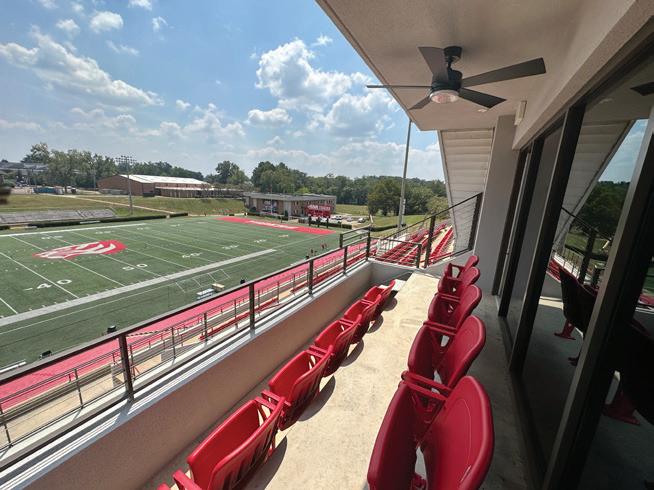
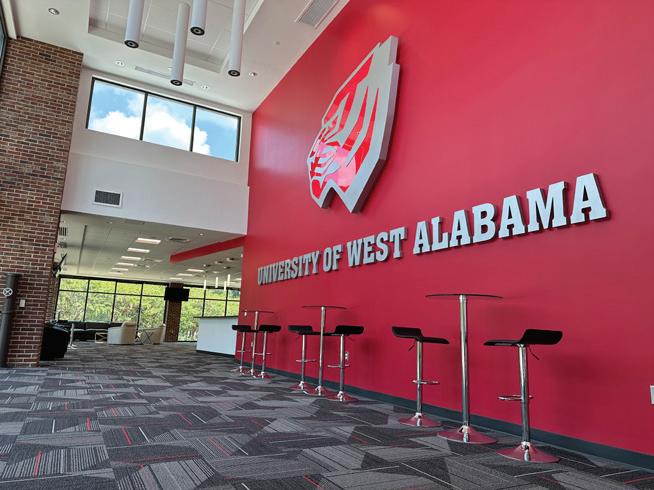
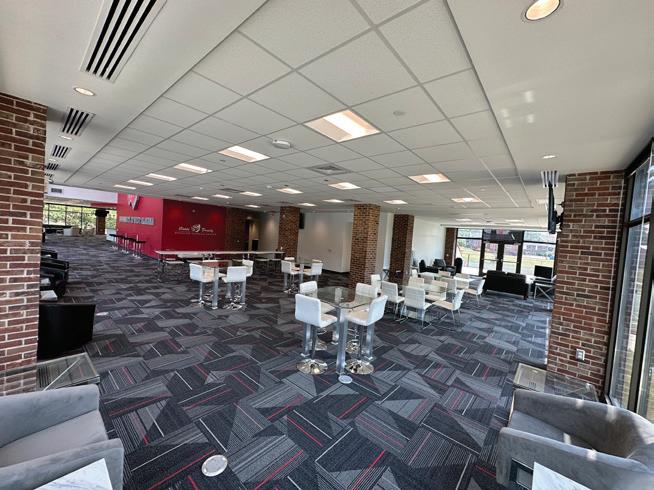
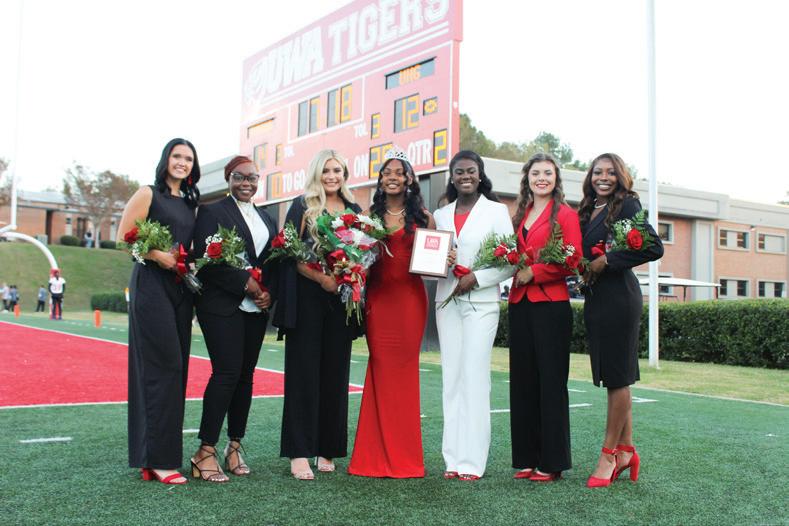

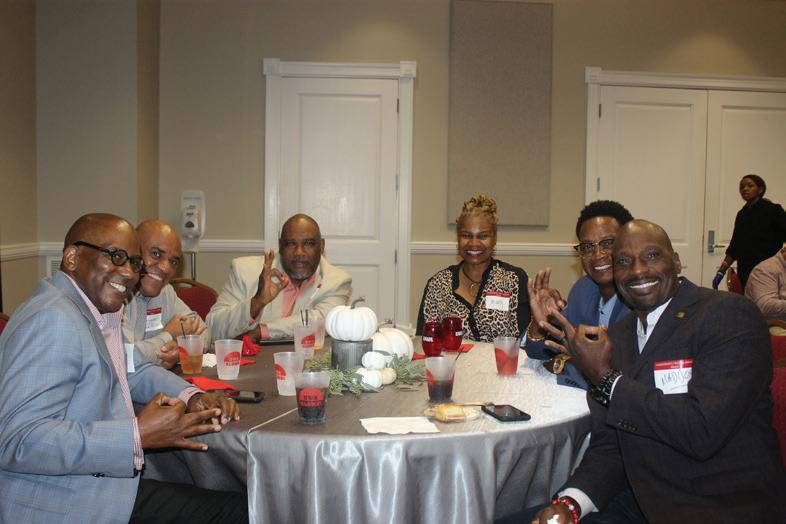


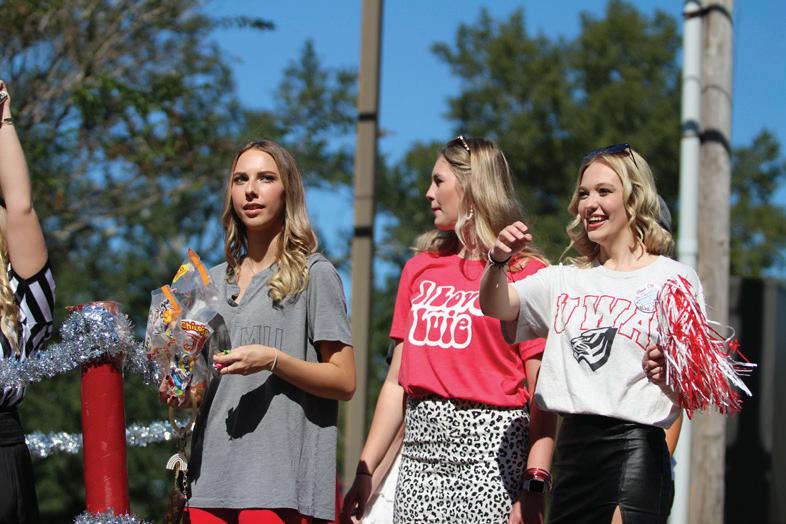






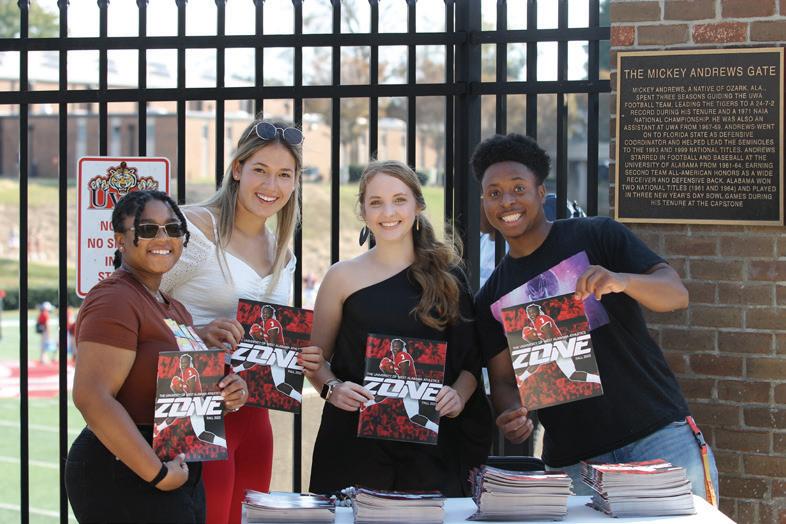
OCTOBER 13-14, 2023
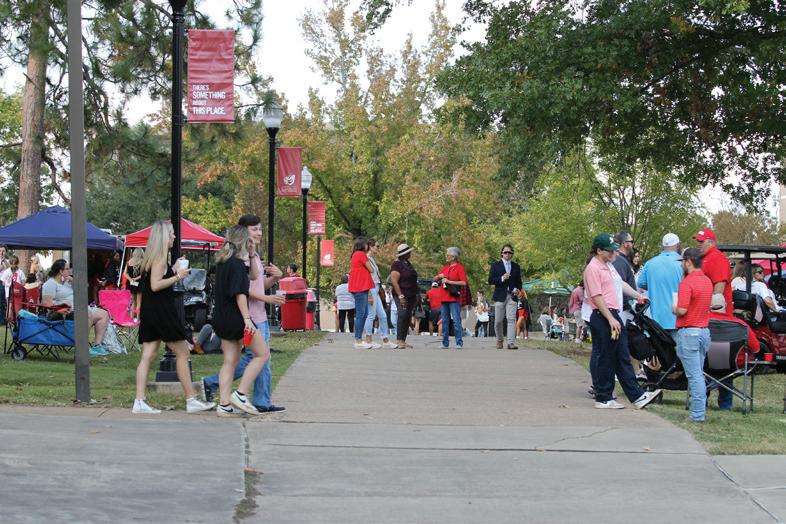
THE COVERED BRIDGE FRIED CHICKEN WEDNESDAY STEP
SHOWS STUDYING AT THE SUB STAIRS AT WALLACE HALL
RUNNING FROM THE DUCKS SERENDIPITY TEA IN THE PARLOR
SPRINGFEST UNIVERSITY CINEMA DRUM LINE ON FOUST LAWN
MIDNIGHT DORM ALARMS FLOATING THE SUCARNOCHEE
THURSDAY NIGHTS GHOST WALKS ROCKING CHAIRS AT WEBB
KEY TO VICTORY THE CHIMES WALKING THE LOOP COOKING OUT AT THE DECKS 71 NATIONAL CHAMPS WIZARD ART CATFISH
FRIDAYS THE BONFIRE OOOWWWAAA YOUR FIRST RODEO THAT LIBRARY WHEELCHAIR DIZZY IZZY ICE CREAM AT THE TIGERS
DEN LAKE CONCERTS LIVINGSTON LIFE STUDY HALL CHECKING MAIL AT THE SUB FISHING AT LAKE LU KILL SECTION IN PRUITT THE L CLUB DEAN HOMER CRAMMING AT THE CAF INDIAN PARTY
SQUIRRELS AT SELDEN THE CATWALK THE BEACH AT THE LAKE
GIVE’EM HELL BIG L SUB POOL TIGER STADIUM ALUMNI PARTY
IT’S NOT JUST ONE THING. And for each of us, it’s different. All the little things. Traditions that transcend generations or name changes. It’s where you spent the most time. It’s what kept you out of trouble—or in it. It’s where you found your best friends, and maybe the love of your life. It’s where you could shine the brightest. It’s where you learned that you could do it, and that the people around you believed it before you did. It’s where your life changed.
When you support the Annual Fund, you are giving back to the University that gave you so much. In the same way that it’s all the little things together that made your college experience so special, all gifts–no matter the size–make an immeasurable difference for the generations that follow you.
To give to your favorite part of your University, scan the code below or visit uwa.edu/givenow
Or mail your gift to UWA Annual Fund
Station 6 Livingston, AL 35470
CLASSIFICATION Junior
HOMETOWN Livingston, Alabama
MAJOR Early Childhood Education
I chose UWA because it is close to home, but also gave me a chance to meet new people. The smaller campus makes me feel comfortable and shows me how close the UWA family is.
When you purchase UWA’s collegiate license plate for an additional $50, you add $48.75 to the National Alumni Association’s Tagged for Success scholarship, which helps students succeed at UWA. Even better, your purchase is tax deductible.
